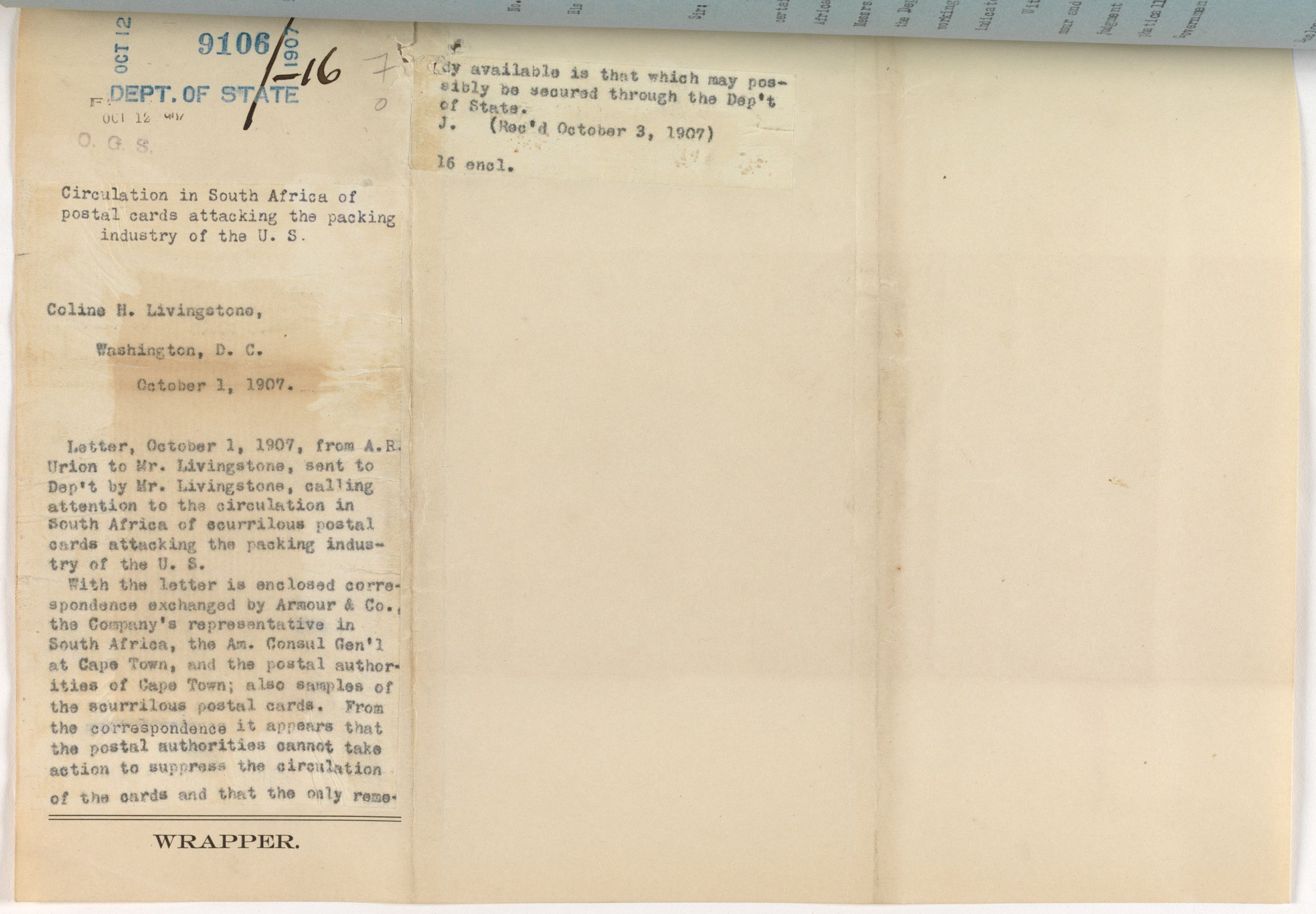The Path to Food Safety
Finding a Sequence
All documents and text associated with this activity are printed below, followed by a worksheet for student responses.Introduction
Working in groups, use contextual clues to place these documents in chronological order. After you have put them in order, as a group choose which document you believe had the biggest influence on the government passing food safety laws. Justify your position.Name:
Class:
Class:
Worksheet
The Path to Food Safety
Finding a Sequence
Examine the documents in this activity. Put the corresponding document numbers in order using the list below. Write your conclusion response in the space provided.1
2
3
4
5
6
7
1
Activity Element
Workers Packing Chipped Beef
Page 1

2
Activity Element
An Act of June 30, 1906, Public Law 59-384, for Preventing the Manufacture, Sale, or Transportation of Adulterated or Misbranded or Poisonous or Deleterious Foods, Drugs, Medicines, and Liquors, and f
Page 3
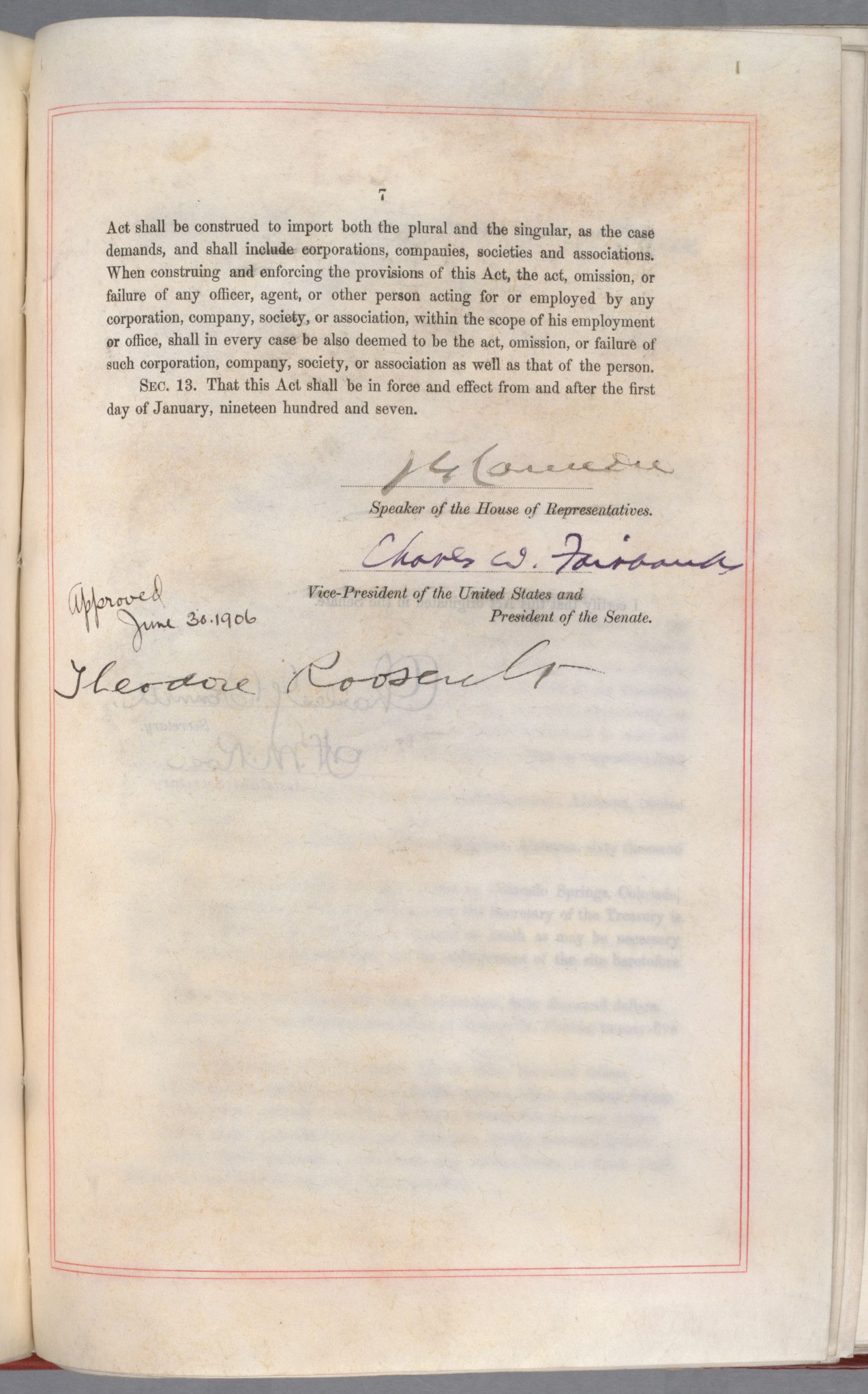
3
Activity Element
Letter from Acting Secretary of State Robert Bacon to U.S. Ambassador to the United Kingdom Whitelaw Reid Discussing Postcards Regarding the Chicago Meatpacking Industry
Page 6

4
Activity Element
Letter to President Theodore Roosevelt from the Federation of Grocers' Associations of the United Kingdom
Page 1
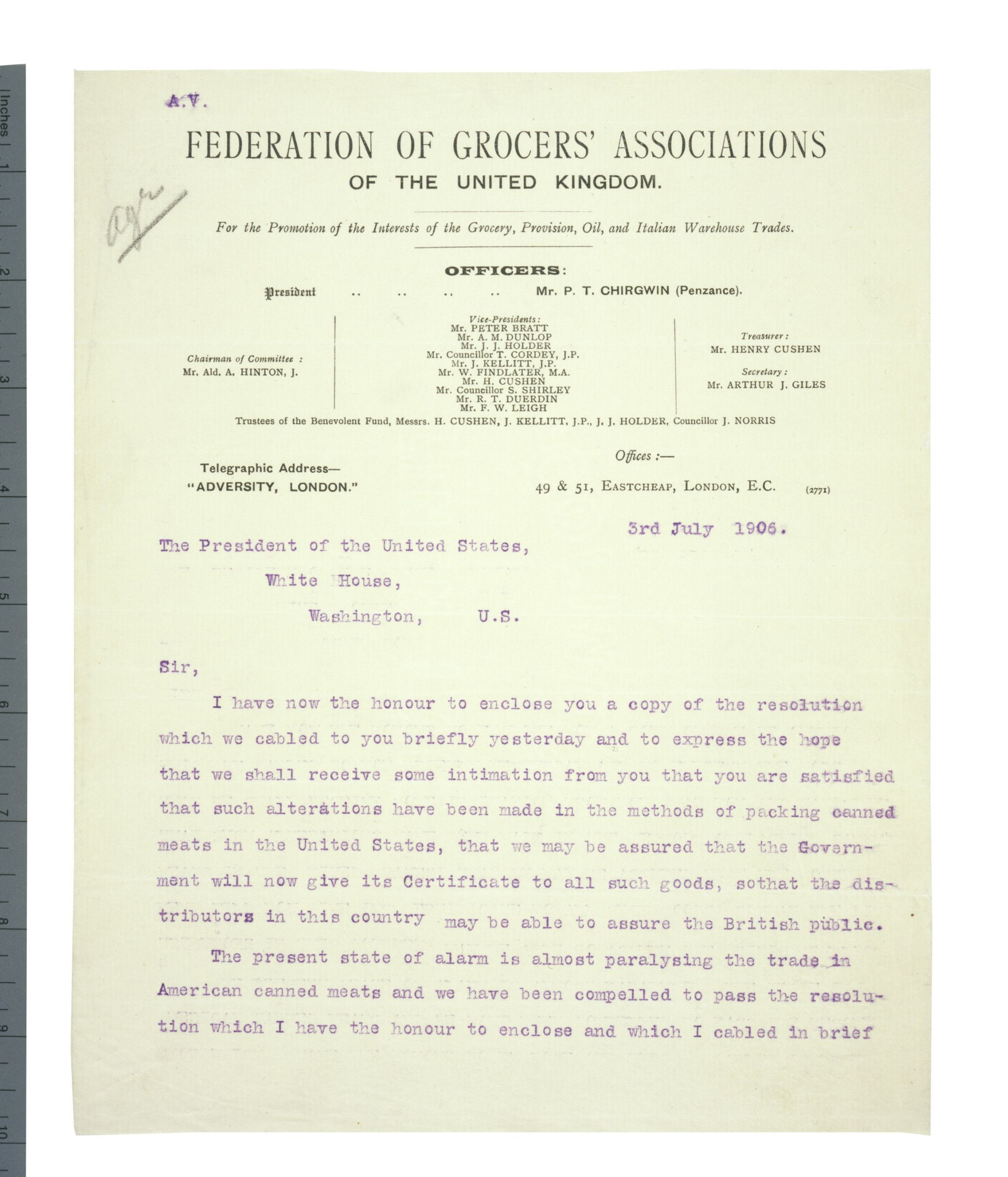
5
Activity Element
Letter from Upton Sinclair to President Theodore Roosevelt
Page 1

6
Activity Element
Report on Conditions in the Chicago Stock Yards
Page 5
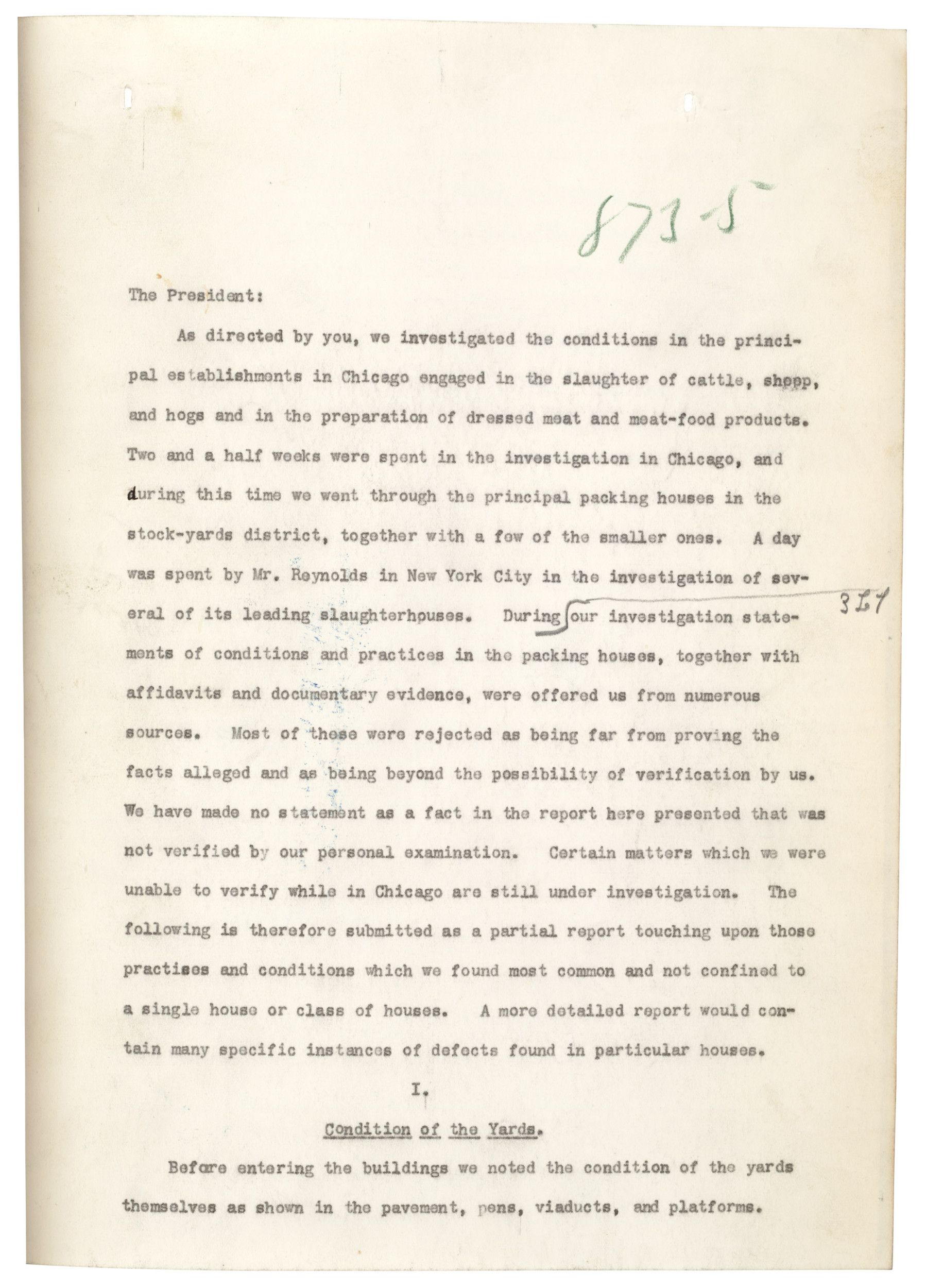
7
Activity Element
Cudahy Packing Co., Omaha, Nebraska
Page 1

Conclusion
The Path to Food Safety
Finding a Sequence
Once you are done, as a group complete the following: DO NOT CLOSE YOUR RESULTS BEFORE completing or you will lose what you need. 1. take a screenshot of your results. 2. Write the titles of the documents in the order you put them. Next to each write a brief description of what it was and how it affected the food safety movement. 3. Think about the documents you viewed. Which one do you believe had the biggest influence in changing food safety laws. Why? 4. Post all of this information to the Schoology Discussion Post: The Path To Food Safety.Your Response
Document
Cudahy Packing Co., Omaha, Nebraska
1910
This primary source comes from the Records of the Bureau of Animal Industry.
National Archives Identifier: 5714090
Full Citation: Cudahy Packing Co., Omaha, Nebraska; 1910; Records of the Bureau of Animal Industry, . [Online Version, https://www.docsteach.org/documents/document/cudahy-packing-co-omaha-nebraska, April 19, 2024]Cudahy Packing Co., Omaha, Nebraska
Page 1
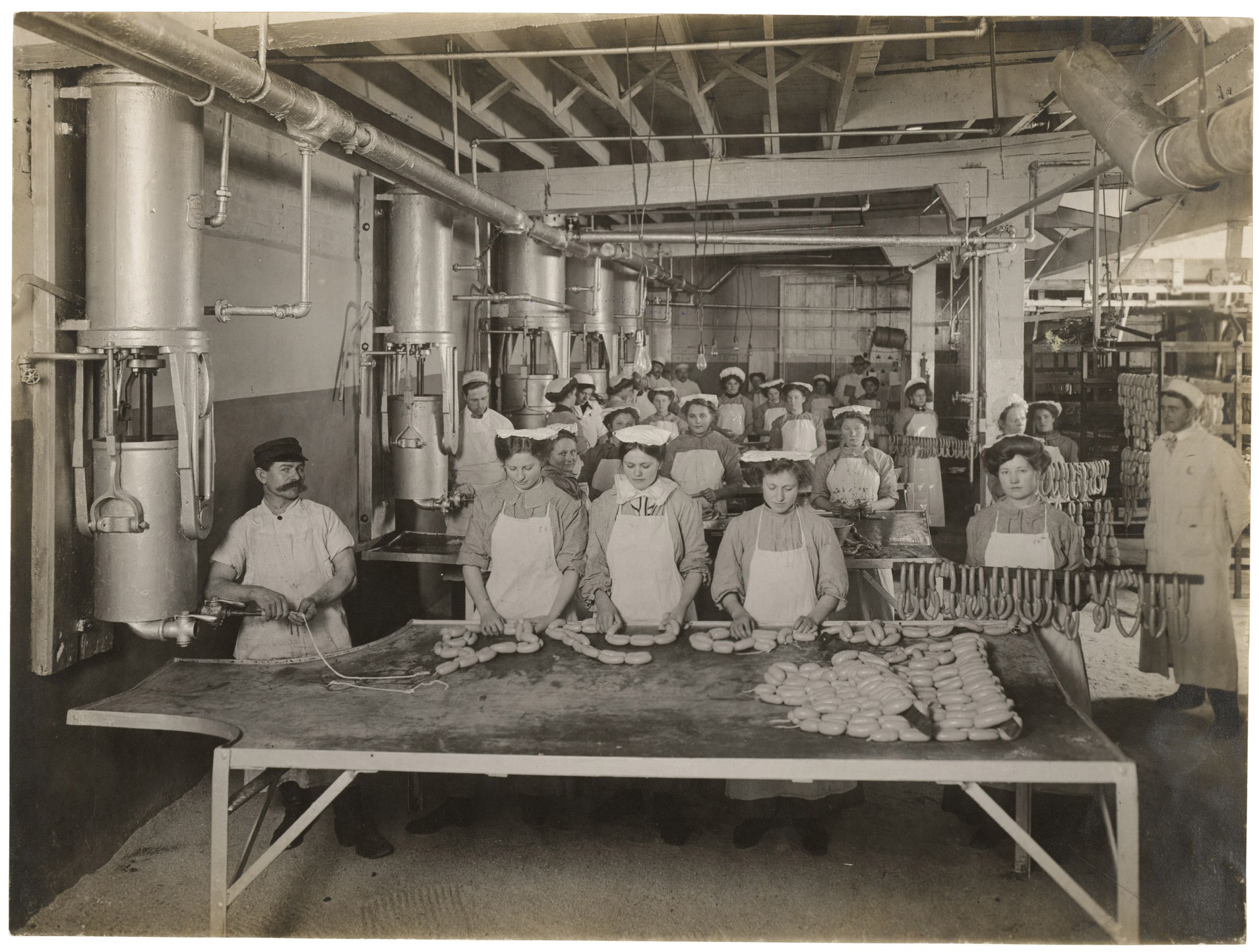
Document
Letter to President Theodore Roosevelt from the Federation of Grocers' Associations of the United Kingdom
7/3/1906
This letter to President Theodore Roosevelt was written by Anthony Giles, Secretary of the Federation of Grocers' Associations of the United Kingdom. Giles asked for President Roosevelt's assurance that canned meat imported from the United States was certified to be safe.
This primary source comes from the Records of the Office of the Secretary of Agriculture.
National Archives Identifier: 594852
Full Citation: Letter to President Theodore Roosevelt from the Federation of Grocers' Associations of the United Kingdom; 7/3/1906; General Correspondence, 1906 - 1975; Records of the Office of the Secretary of Agriculture, ; National Archives at College Park, College Park, MD. [Online Version, https://www.docsteach.org/documents/document/theodore-roosevelt-grocers, April 19, 2024]Letter to President Theodore Roosevelt from the Federation of Grocers' Associations of the United Kingdom
Page 1
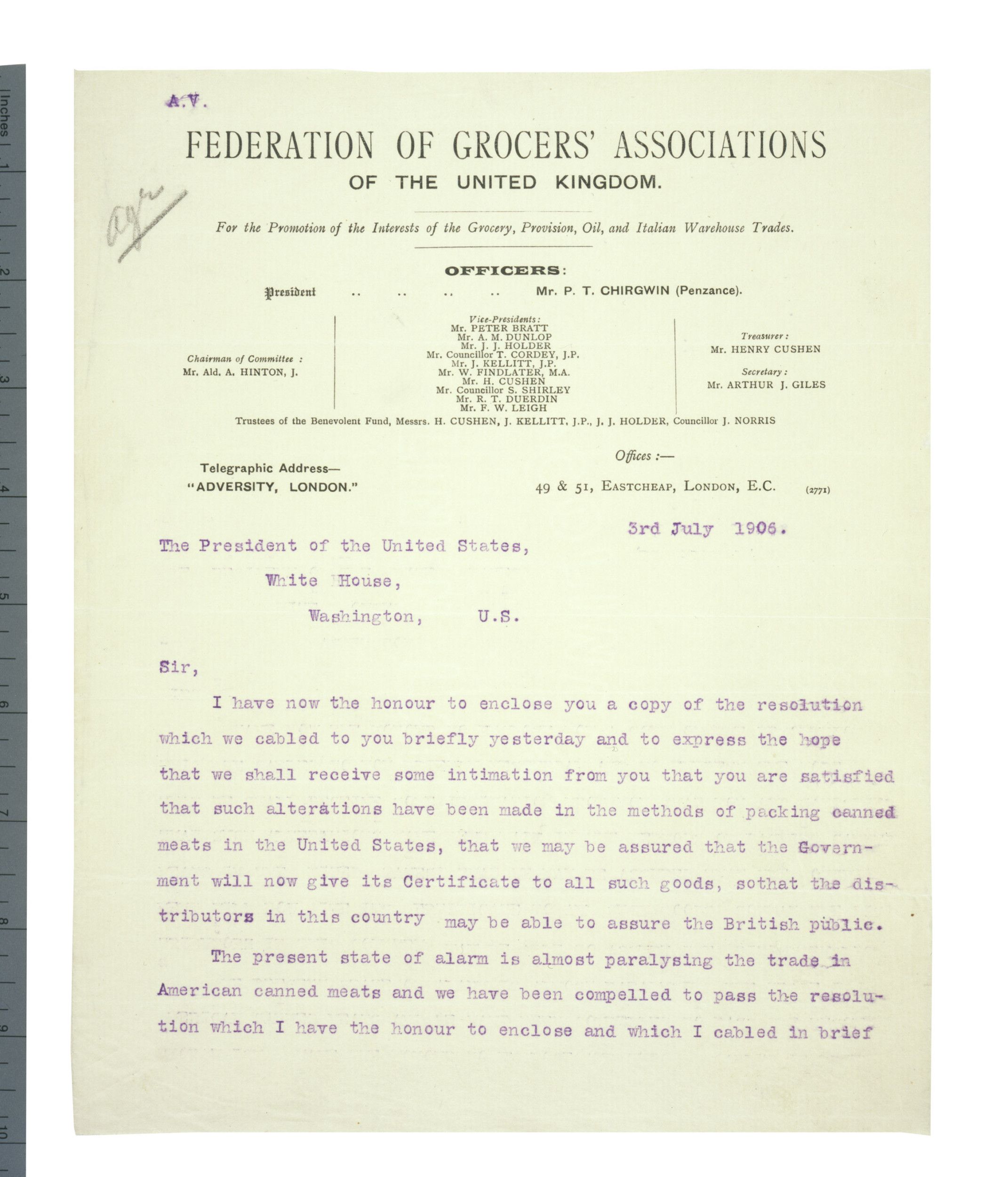
Letter to President Theodore Roosevelt from the Federation of Grocers' Associations of the United Kingdom
Page 2
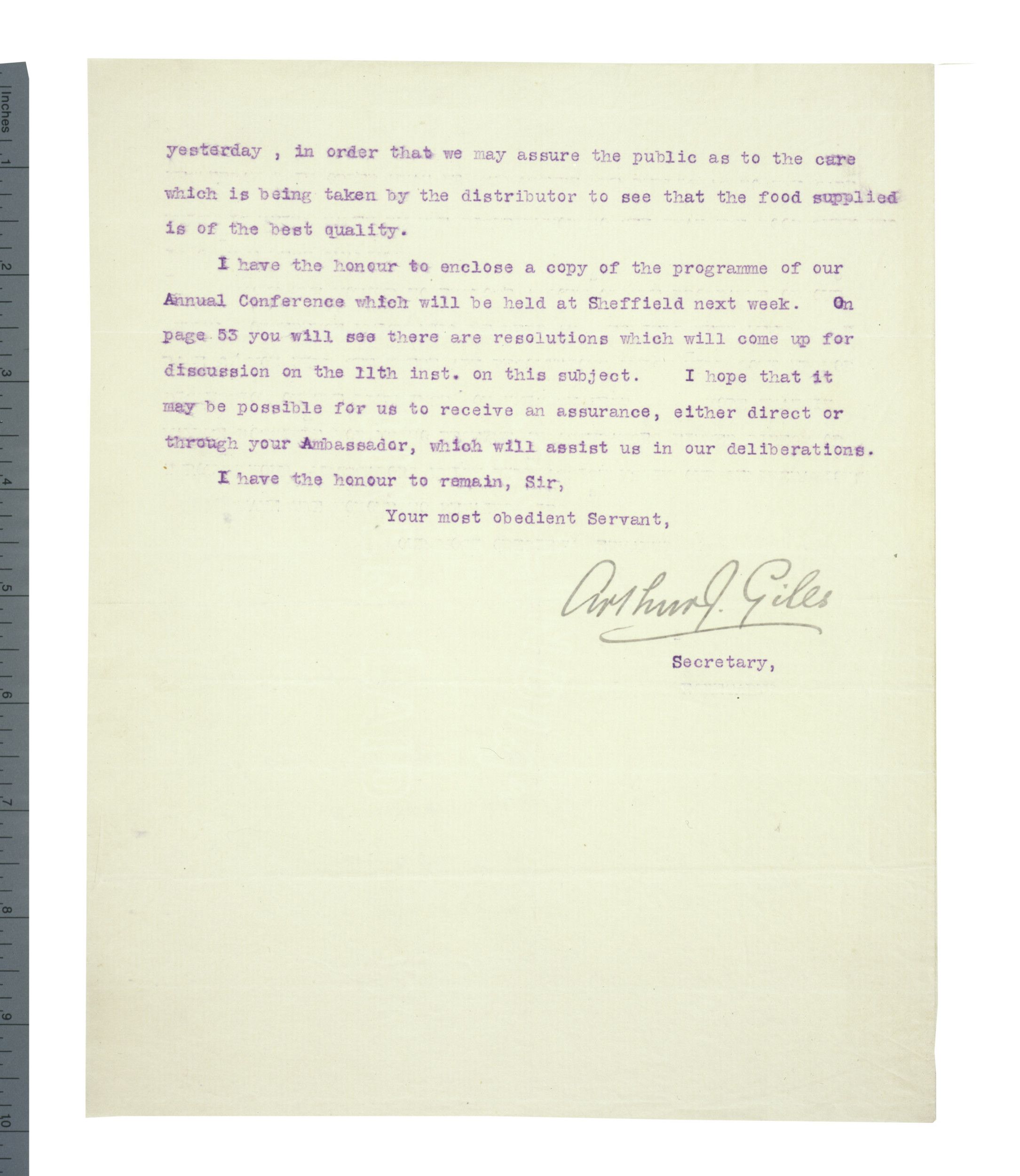
Document
Workers Packing Chipped Beef
1910
The Meat Inspection Act, unlike the Pure Food and Drug Act, provided for inspection and approval before products went to market. Early meat inspection activities were documented in a photographic album, "the United States Government Inspection at the Meat Packing Establishments."
This primary source comes from the Records of the Bureau of Animal Industry.
National Archives Identifier: 5714086
Full Citation: Workers Packing Chipped Beef; 1910; Records of the Bureau of Animal Industry, . [Online Version, https://www.docsteach.org/documents/document/workers-packing-chipped-beef, April 19, 2024]Workers Packing Chipped Beef
Page 1
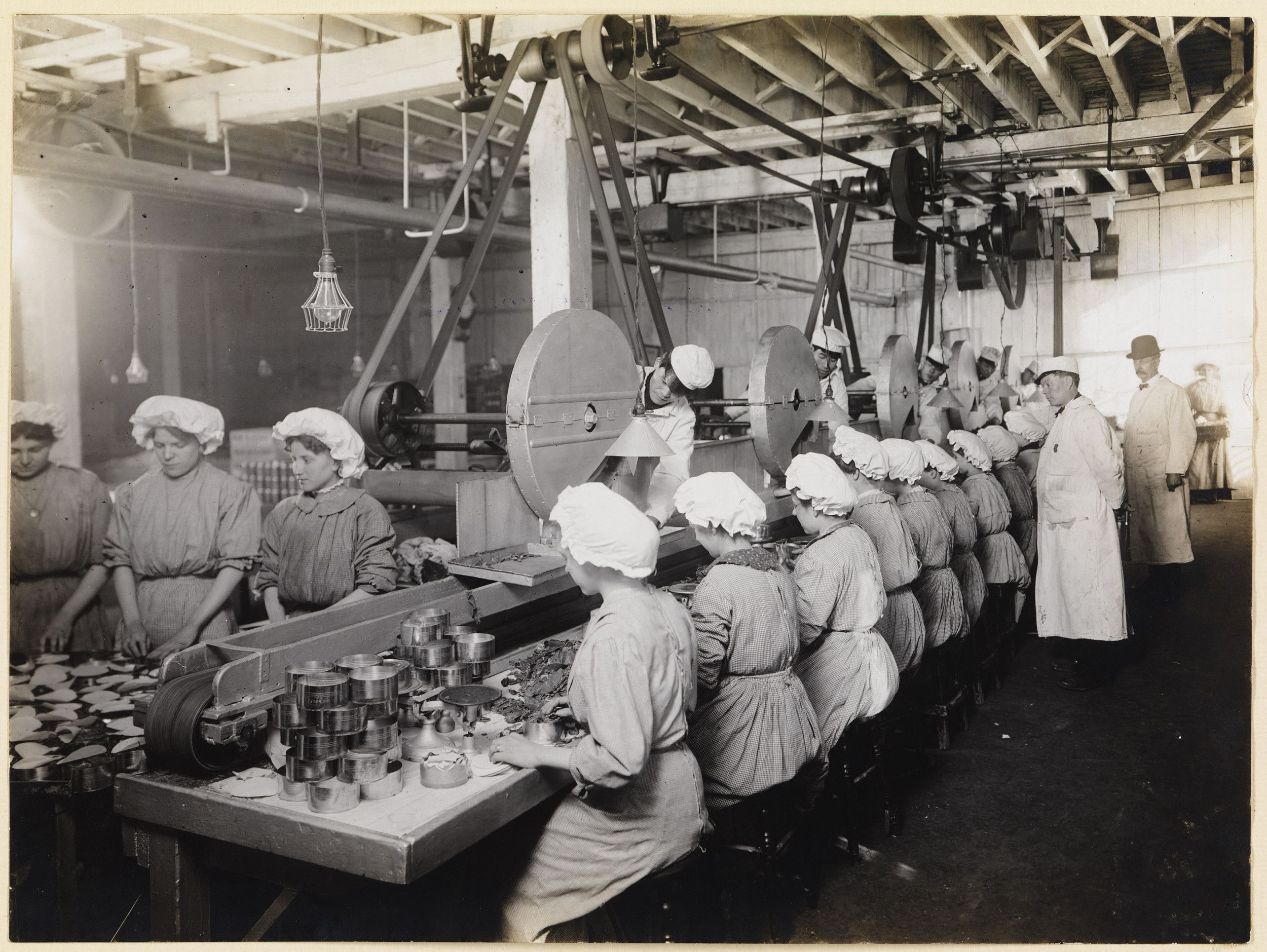
Document
An Act of June 30, 1906, Public Law 59-384, 34 STAT 768, for Preventing the Manufacture, Sale, or Transportation of Adulterated or Misbranded or Poisonous or Deleterious Foods, Drugs, Medicines, and Liquors, and for Regulating Traffic Therein, and fo
6/30/1906
The Pure Food and Drugs Act made it illegal to ship or receive any adulterated or misbranded food or drug. To remove foods deemed “filthy, decomposed, or putrid” from the market, Food and Drug Administration (FDA) agents had to build scientific and legal cases against them.
The full title of the act is: An Act of June 30, 1906, Public Law 59-384, 34 STAT 768, for Preventing the Manufacture, Sale, or Transportation of Adulterated or Misbranded or Poisonous or Deleterious Foods, Drugs, Medicines, and Liquors, and for Regulating Traffic Therein, and for Other Purposes.
The full title of the act is: An Act of June 30, 1906, Public Law 59-384, 34 STAT 768, for Preventing the Manufacture, Sale, or Transportation of Adulterated or Misbranded or Poisonous or Deleterious Foods, Drugs, Medicines, and Liquors, and for Regulating Traffic Therein, and for Other Purposes.
Transcript
Fifty-ninth Congress of the United States of America;At the First session,
Begun and held at the City of Washington on Monday, the fourth day of December, one
thousand nine hundred and five.
AN ACT
For preventing the manufacture, sale, or transportation of adulterated or misbranded or poisonous or deleterious foods, drugs, medicines, and liquors, and for regulating traffic therein, and for other purposes.
Be it enacted by the Senate and House of Representatives of the United States of America in Congress assembled, That it shall be unlawful for any persons to manufacture within any Territory or the District of Columbia any article of food or drug which is adulterated or misbranded, within the meaning of this Act; and any person who shall violate any of the provisions of this section shall be guilty of a misdemeanor, and for each offense shall, upon conviction thereof, be fined not to exceed five hundred dollars or shall be sentenced to one year's imprisonment, or both such fine and imprisonment, in the discretion of the court, and for each subsequent offense and conviction thereof shall be fined not less than one thousand dollars or sentenced to one year's imprisonment, or both such fine and imprisonment, in the discretion of the court.
SEC. 2. That the introduction into any State or Territory or the District of Columbia from any other State or Territory or the District of Columbia, or from any foreign country, or shipment to any foreign country of any article of food or drugs which is adulterated or misbranded, within the meaning of this Act, is hereby prohibited; and any person who shall ship or deliver for shipment from any State or Territory or the District of Columbia to any other State or Territory or the District of Columbia, or to a foreign country, or who shall receive in any State or Territory for the District of Columbia from any other State or Territory or the District of Columbia, or foreign country, and having so received, shall deliver, in original unbroken packages, for pay or otherwise,
3
article duly authenticated by the analyst or officer making such examination, under the oath of such officer. After the judgment of the court, notice shall be given by publication in such manner as may be prescribed by the rules and regulations aforesaid.
SEC. 5. That it shall be the duty of each district attorney to whom the Secretary of Agriculture shall report any violation of this Act, or to whom any health or food or drug officer or agent of any State, Territory, or the District of Columbia shall present satisfactory evidence of any such violation, to cause appropriate proceedings to be commenced and prosecuted in the proper courts of the United States, without delay, for the enforcement of the penalties as in such case herein provided.
SEC. 6. That the term "drug," as used in this Act, shall include all medicines and preparations recognized in the United States Pharmacopeia or National Formulary for internal or external use, and any substance or mixture of substances intended to be used for the cure, mitigation, or prevention of disease of either man or other animals. The term "food," as used herein, shall include all articles used for food, drink, confectionery, or condiment by man or other animals, whether simple, mixed, or compound.
SEC. 7. That for the purpose of this Act and article shall be deemed to be adulterated:
In case of drugs:
First. If, when a drug is sold under or by a name recognized in the United States Pharmacopeia or National Formulary, it differs from the standard of strength, quality, or purity, as determined by the test laid down in the United State Pharmacopeia or National Formulary official at the time of investigation: Provided, That no drug in the United States Pharmacopeia or National Formulary shall be deemed to be adulterated under this provision if the standard of strength, quality, or purity be plainly stated upon the bottle, box, or other container thereof although the standard may differ from that determined by the test laid down in the United States Pharmacopeia or National Formulary.
Second. If its strength or purity fall below the professed standard or quality under which it is sold.
In the case of confectionery:
If it contains terra alba, barytes, talc, chrome yellow, or other mineral substance or poisonous color or flavor, or other ingredient deleterious or detrimental to health, or any vinous malt or spirituous liquor or compound or narcotic drug.
In the case of food:
First. If any substance has been mixed and packed with it so as to reduce or lower or injuriously affect its quality or strength.
Second. If any substance has been substituted wholly or in part for the article.
Third. If any valuable constituent of the article has been wholly or in part abstracted.
7
Act shall be construed to import both the plural and the singular, as the case demands, and shall include corporations, companies, societies and associations. When construing and enforcing the provisions of this Act, the act, omission, or failure of any officer, agent, or other person acting for or employed by any corporation, company, society, or association as well as that of the person.
SEC. 13. That this Act shall be in force and effect from and after the first day of January, nineteen hundred and seven.
J G Cannon
Speaker of the House of Representatives.
Charles W. Fairbanks
Vice-President of the United States and President of the Senate
Approved June 30, 1906
Theodore Roosevelt
This primary source comes from the General Records of the United States Government.
National Archives Identifier: 5716297
Full Citation: An Act of June 30, 1906, Public Law 59-384, 34 STAT 768, for Preventing the Manufacture, Sale, or Transportation of Adulterated or Misbranded or Poisonous or Deleterious Foods, Drugs, Medicines, and Liquors, and for Regulating Traffic Therein, and fo; 6/30/1906; Enrolled Acts and Resolutions of Congress, 1789 - 2011; General Records of the United States Government, ; National Archives Building, Washington, DC. [Online Version, https://www.docsteach.org/documents/document/pure-food-and-drug-act, April 19, 2024]An Act of June 30, 1906, Public Law 59-384, 34 STAT 768, for Preventing the Manufacture, Sale, or Transportation of Adulterated or Misbranded or Poisonous or Deleterious Foods, Drugs, Medicines, and Liquors, and for Regulating Traffic Therein, and fo
Page 1
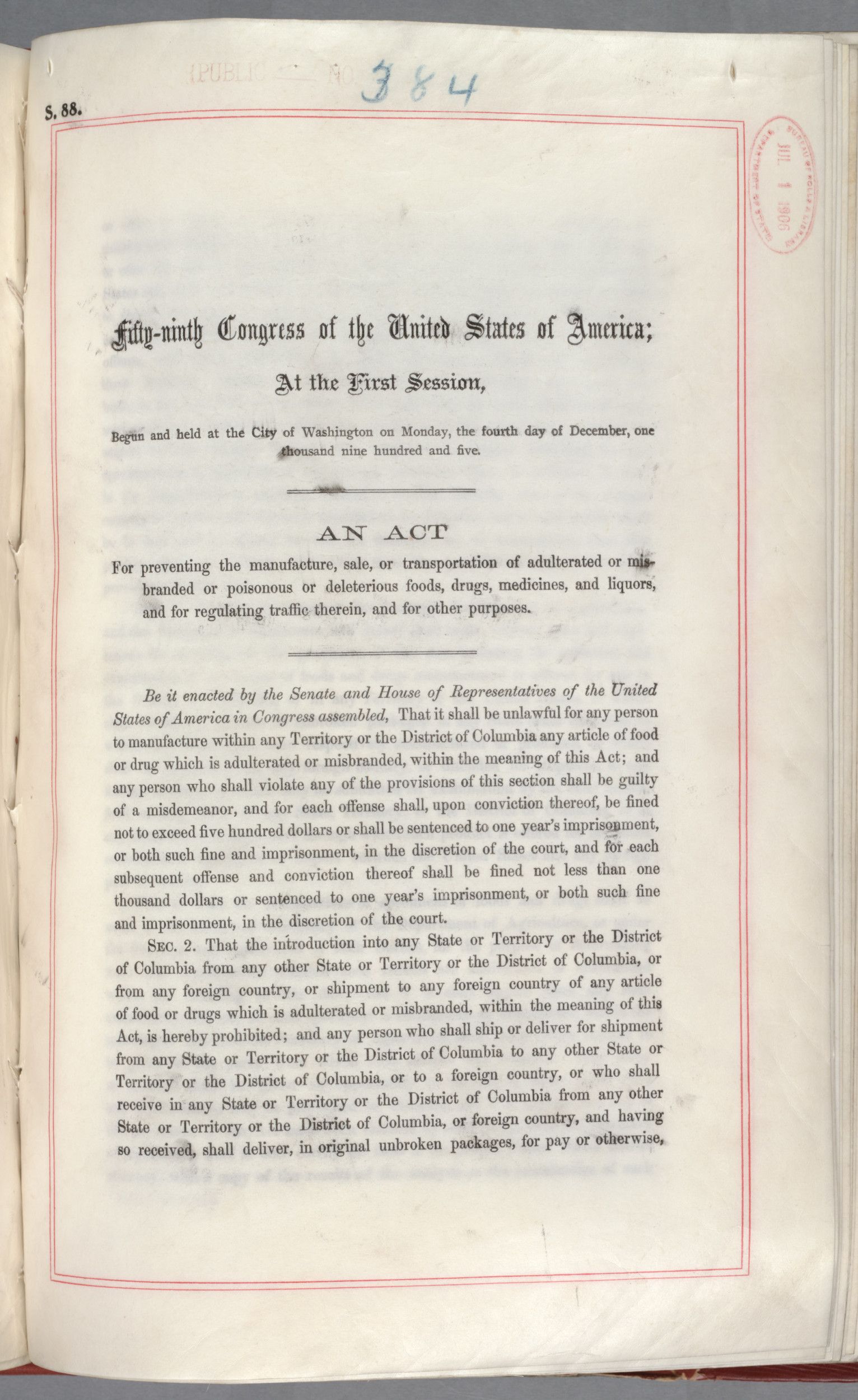
An Act of June 30, 1906, Public Law 59-384, 34 STAT 768, for Preventing the Manufacture, Sale, or Transportation of Adulterated or Misbranded or Poisonous or Deleterious Foods, Drugs, Medicines, and Liquors, and for Regulating Traffic Therein, and fo
Page 2
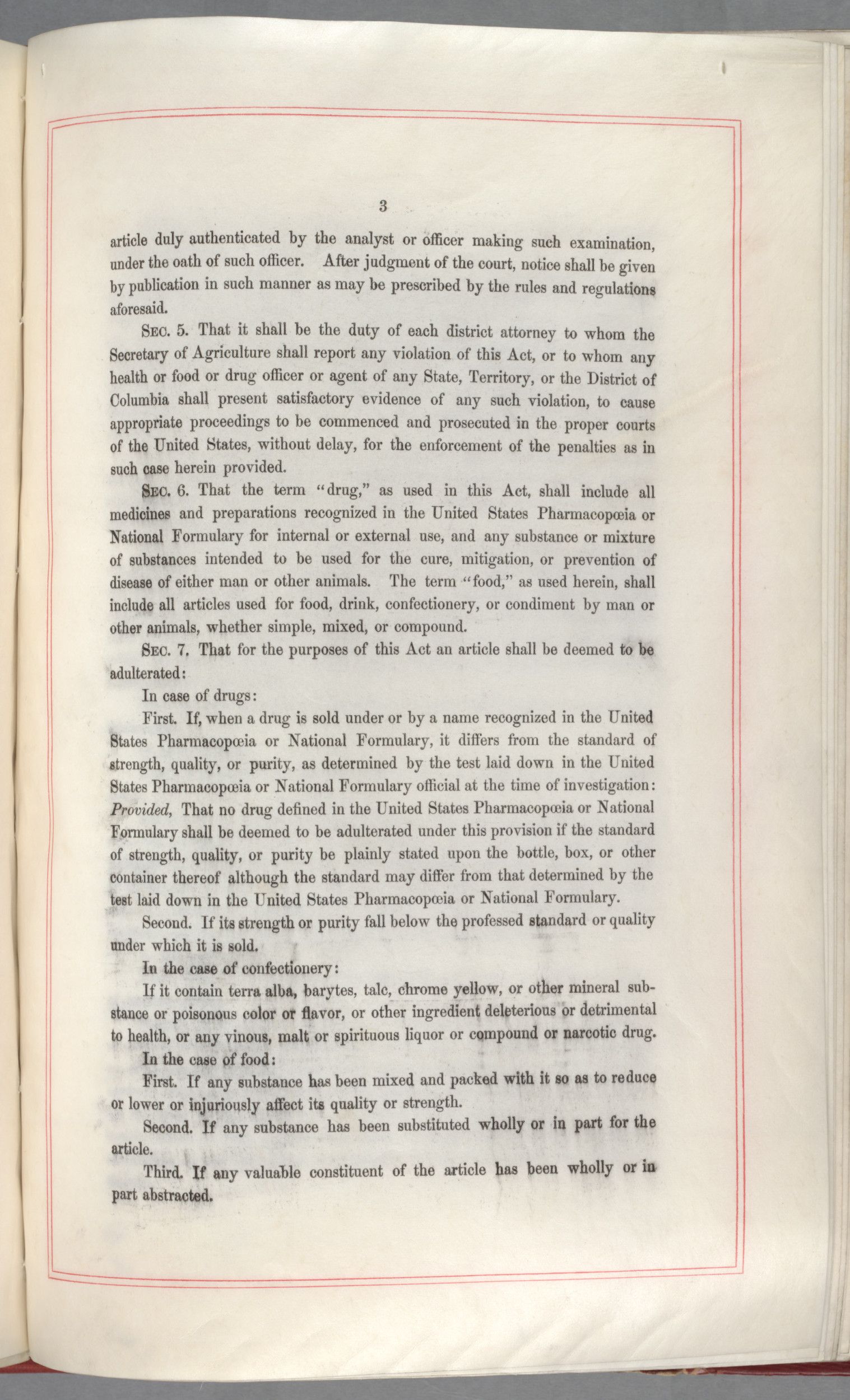
An Act of June 30, 1906, Public Law 59-384, 34 STAT 768, for Preventing the Manufacture, Sale, or Transportation of Adulterated or Misbranded or Poisonous or Deleterious Foods, Drugs, Medicines, and Liquors, and for Regulating Traffic Therein, and fo
Page 3
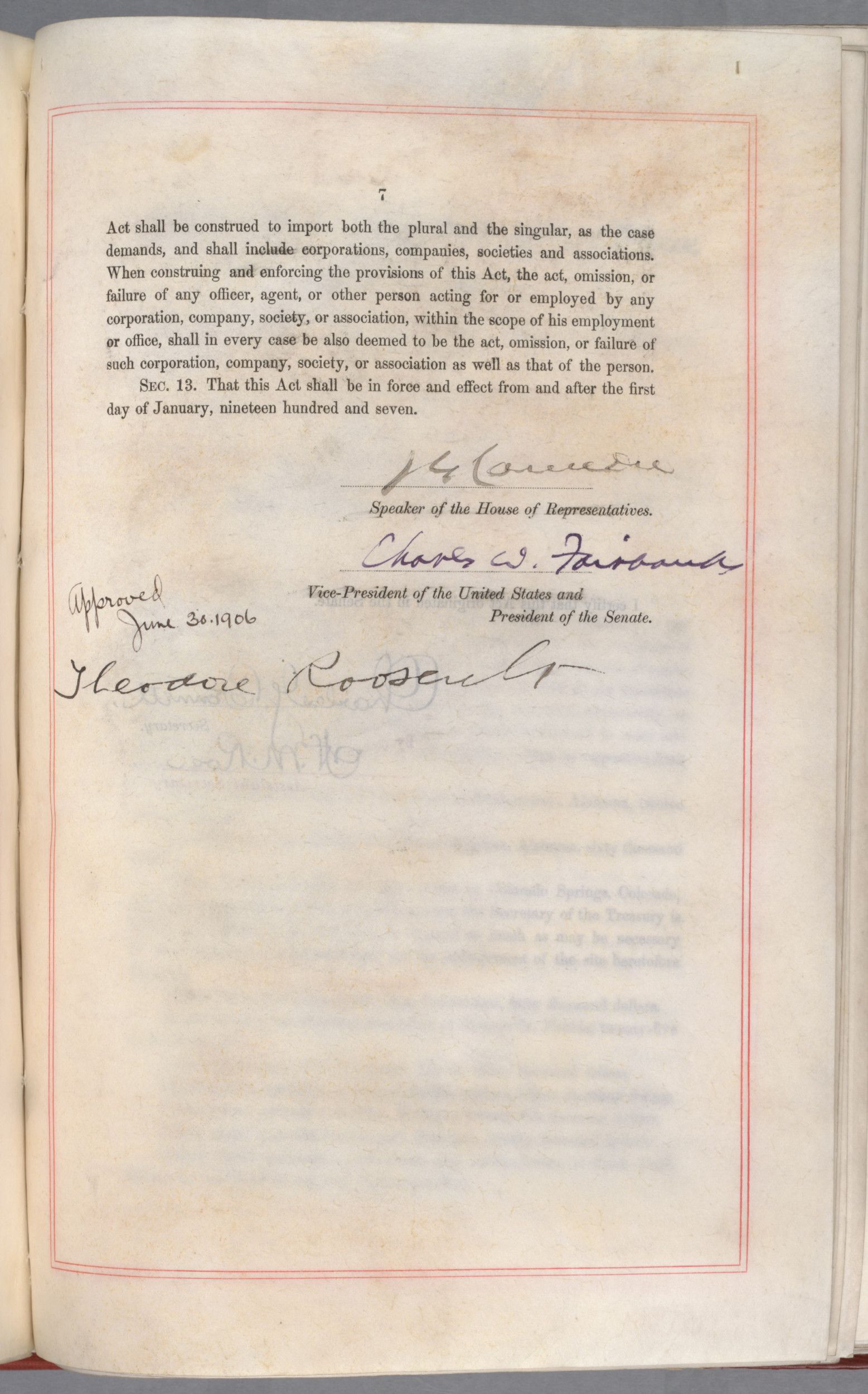
Document
Report on Conditions in the Chicago Stock Yards
1905
Labor Commissioner Charles Neill and Assistant Secretary of the Treasury James Reynolds were commissioned by President Theodore Roosevelt to conduct an inspection of the meatpacking industry.
This primary source comes from the Records of the U.S. House of Representatives.
National Archives Identifier: 595296
Full Citation: Report on Conditions in the Chicago Stock Yards; 1905; Records of the U.S. House of Representatives, . [Online Version, https://www.docsteach.org/documents/document/report-on-conditions-in-the-chicago-stock-yards, April 19, 2024]Report on Conditions in the Chicago Stock Yards
Page 5
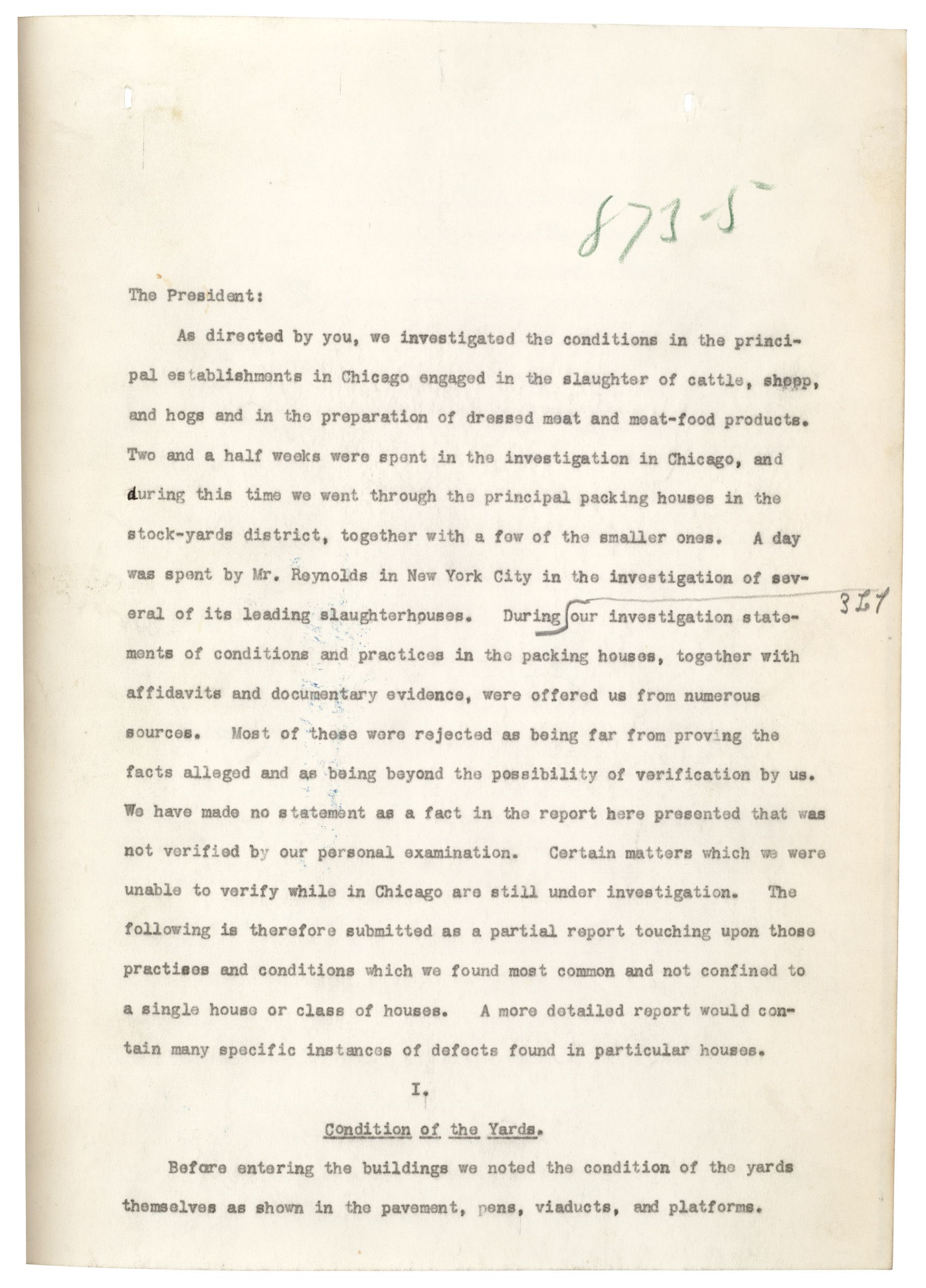
Report on Conditions in the Chicago Stock Yards
Page 6
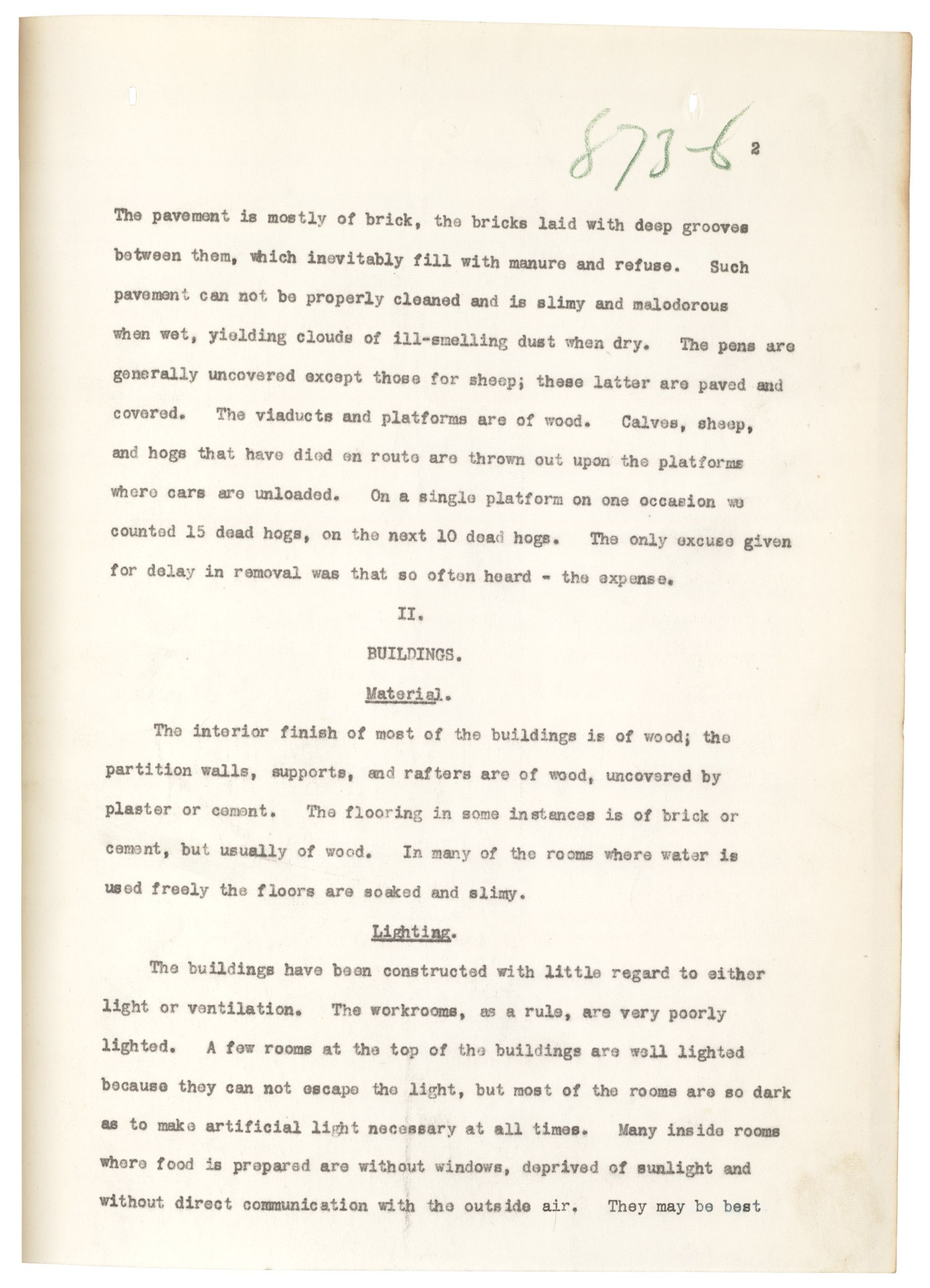
Report on Conditions in the Chicago Stock Yards
Page 10
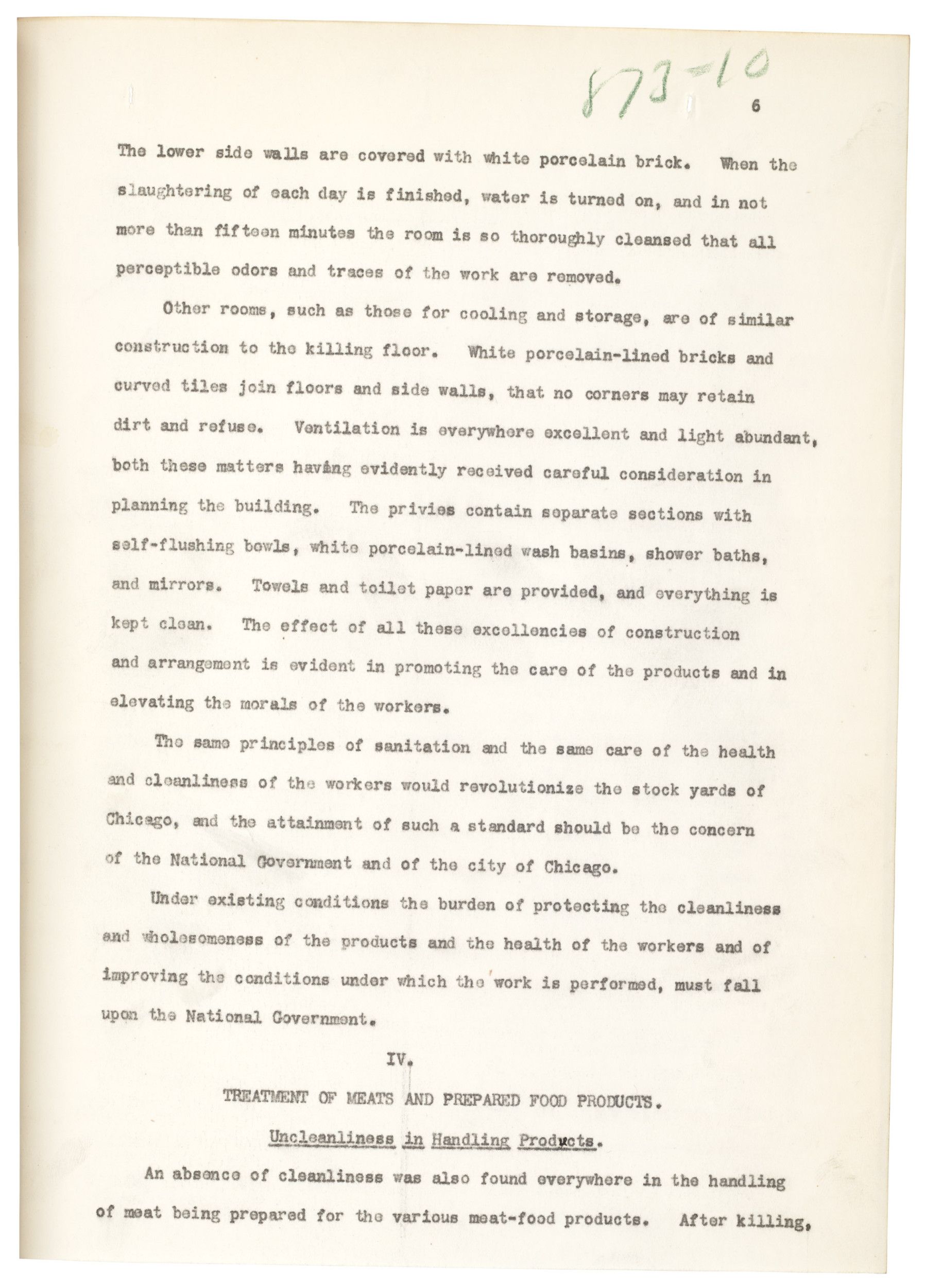
Report on Conditions in the Chicago Stock Yards
Page 15
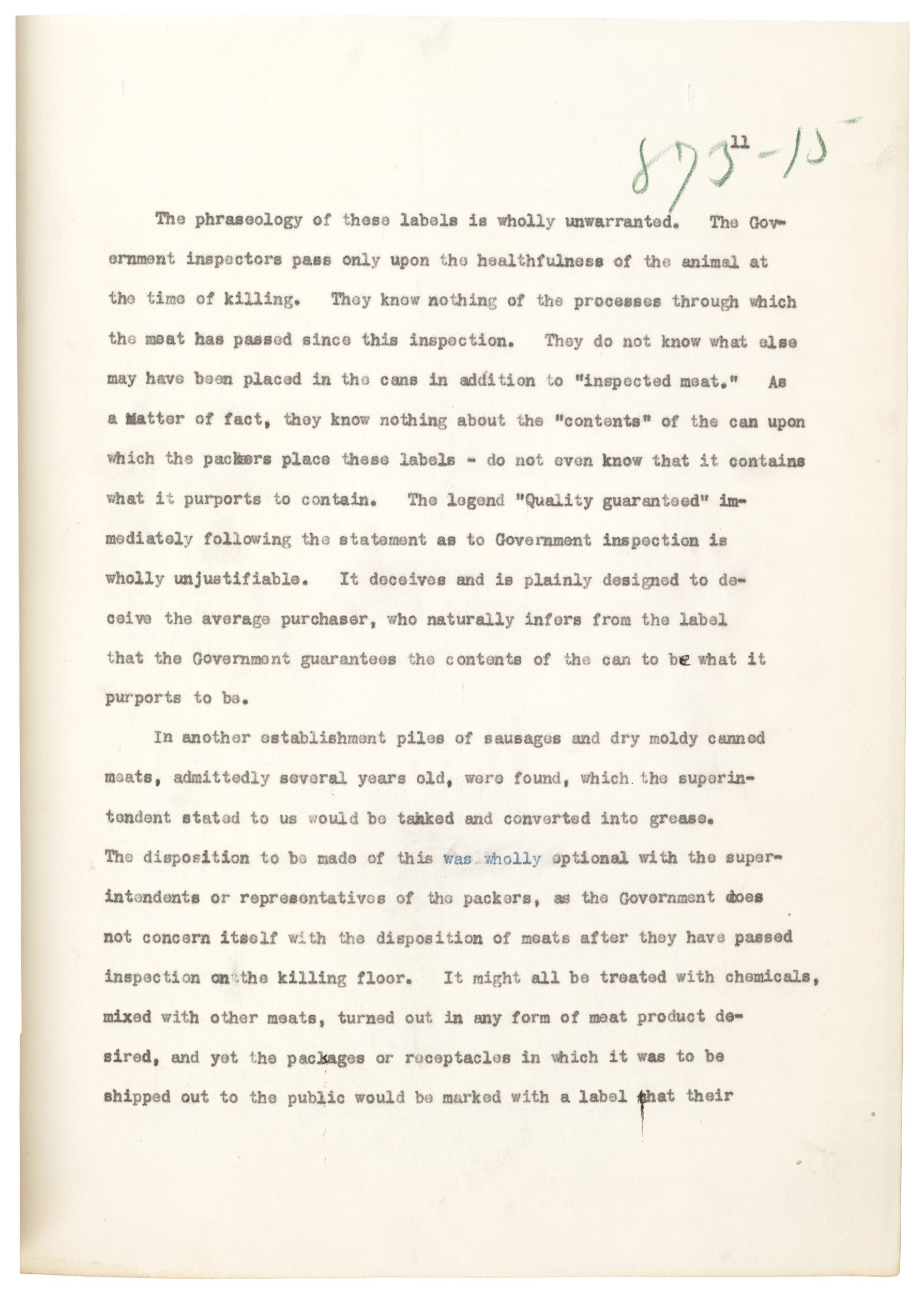
Report on Conditions in the Chicago Stock Yards
Page 11
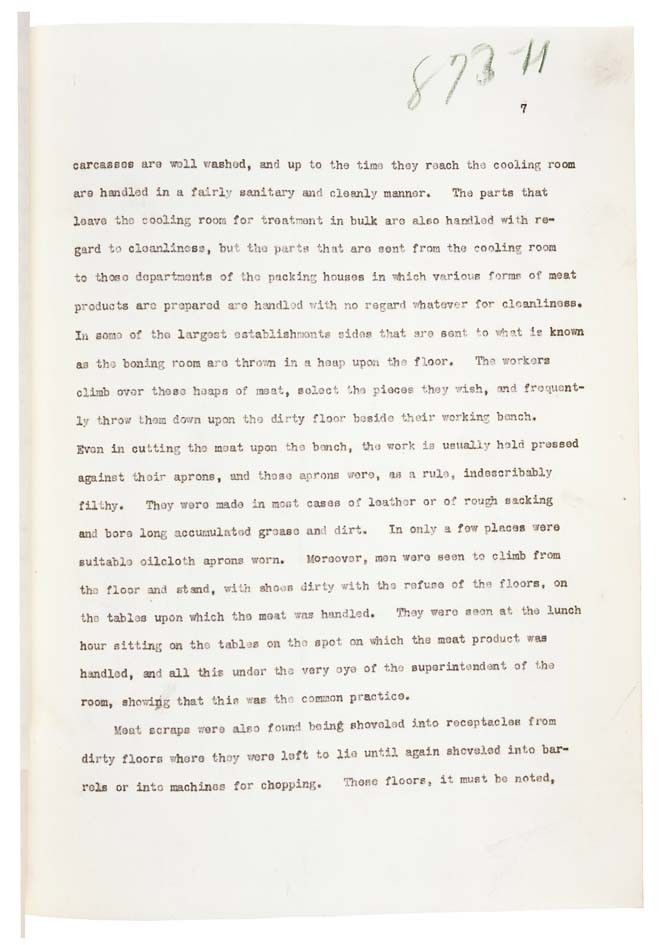
Report on Conditions in the Chicago Stock Yards
Page 16
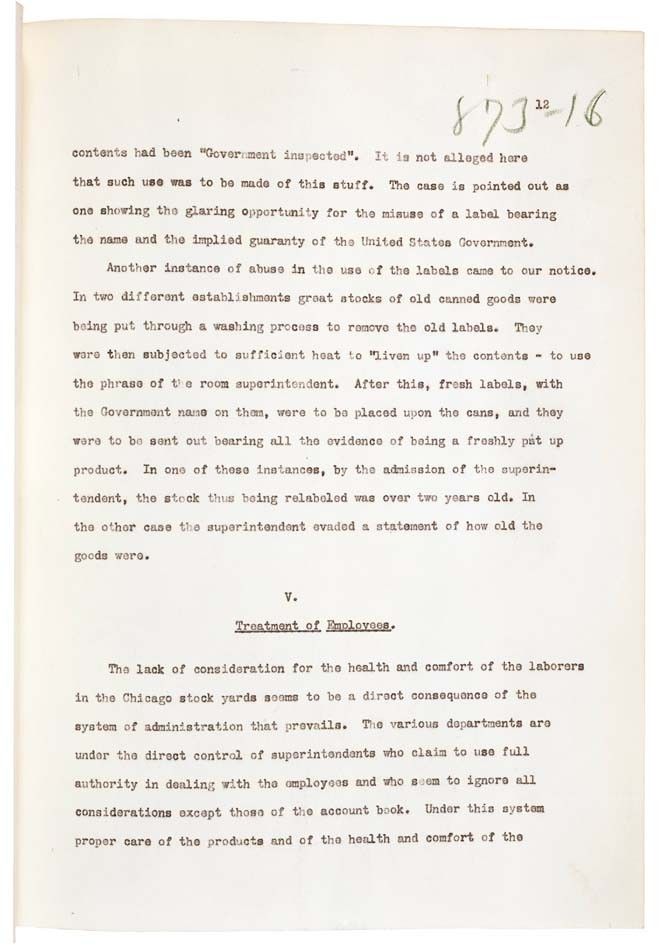
Report on Conditions in the Chicago Stock Yards
Page 1
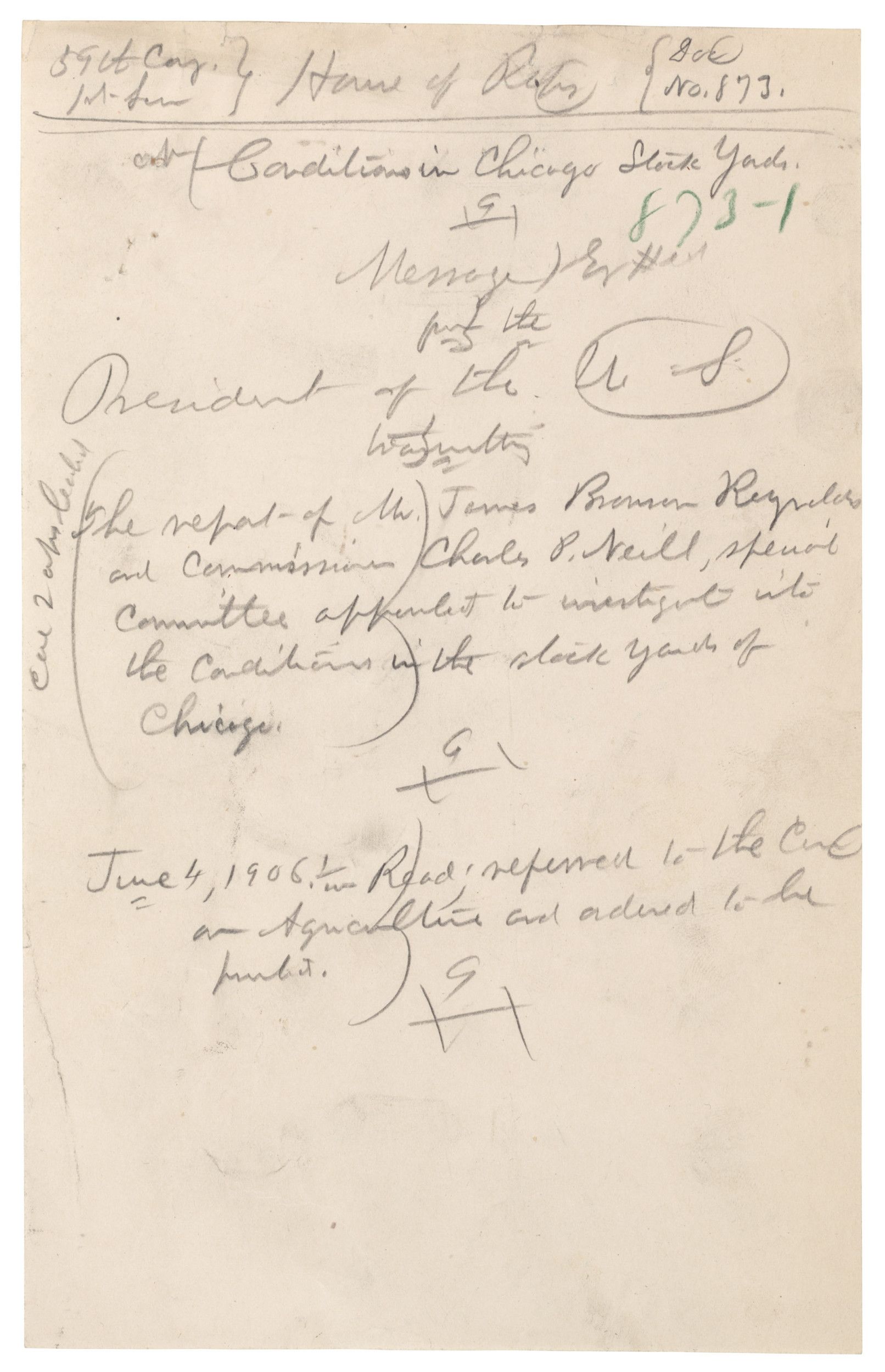
Report on Conditions in the Chicago Stock Yards
Page 2
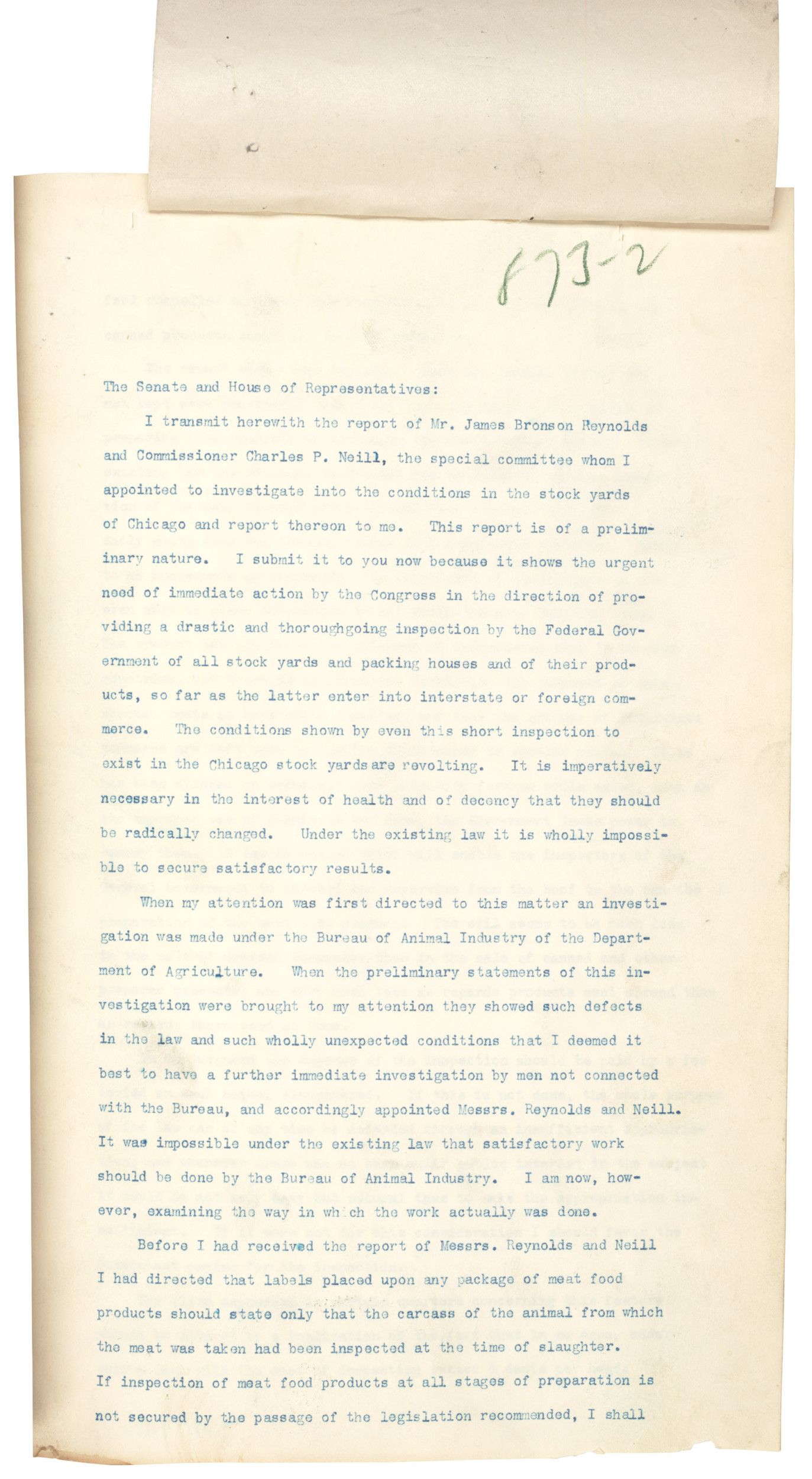
Report on Conditions in the Chicago Stock Yards
Page 3
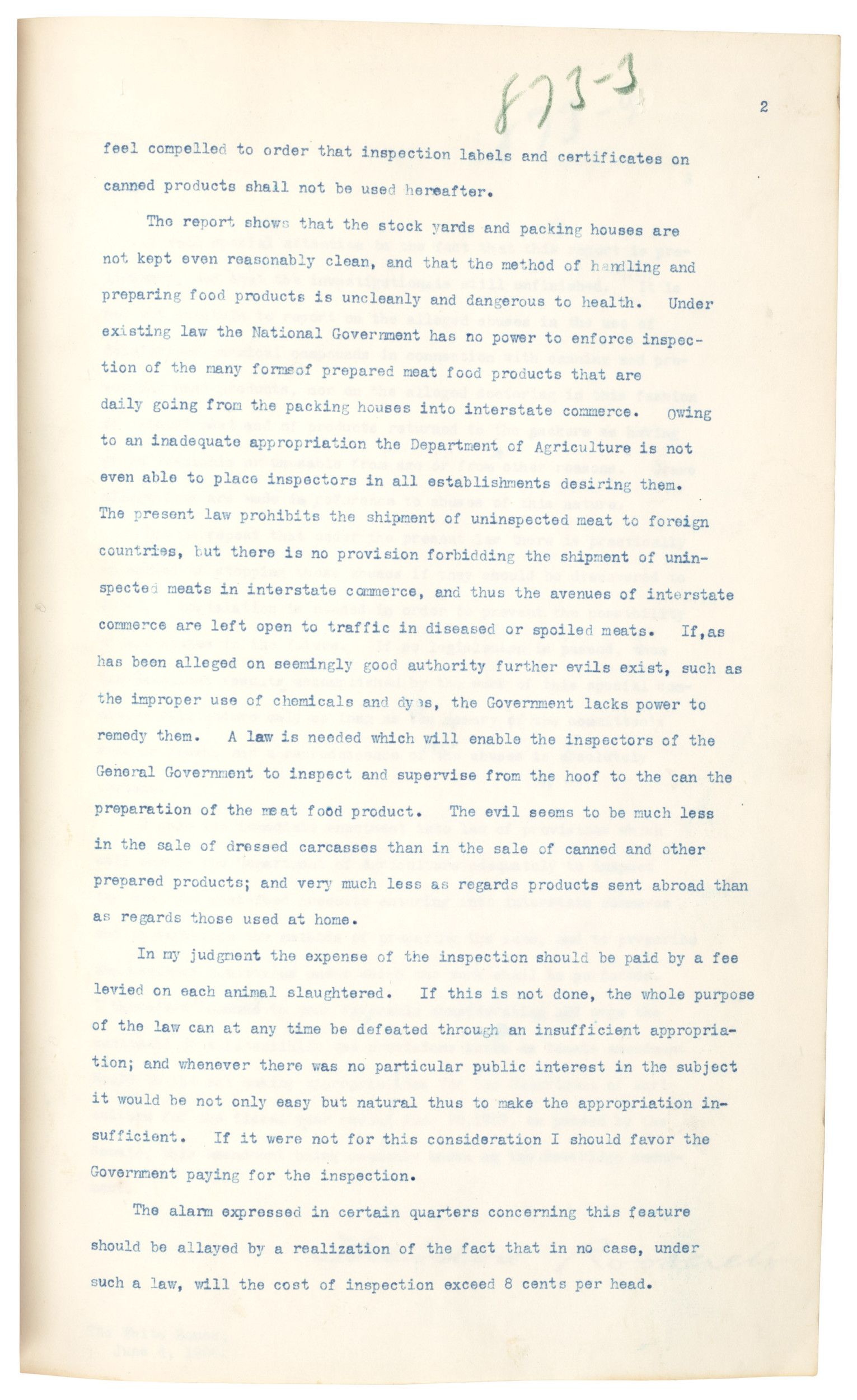
Report on Conditions in the Chicago Stock Yards
Page 4
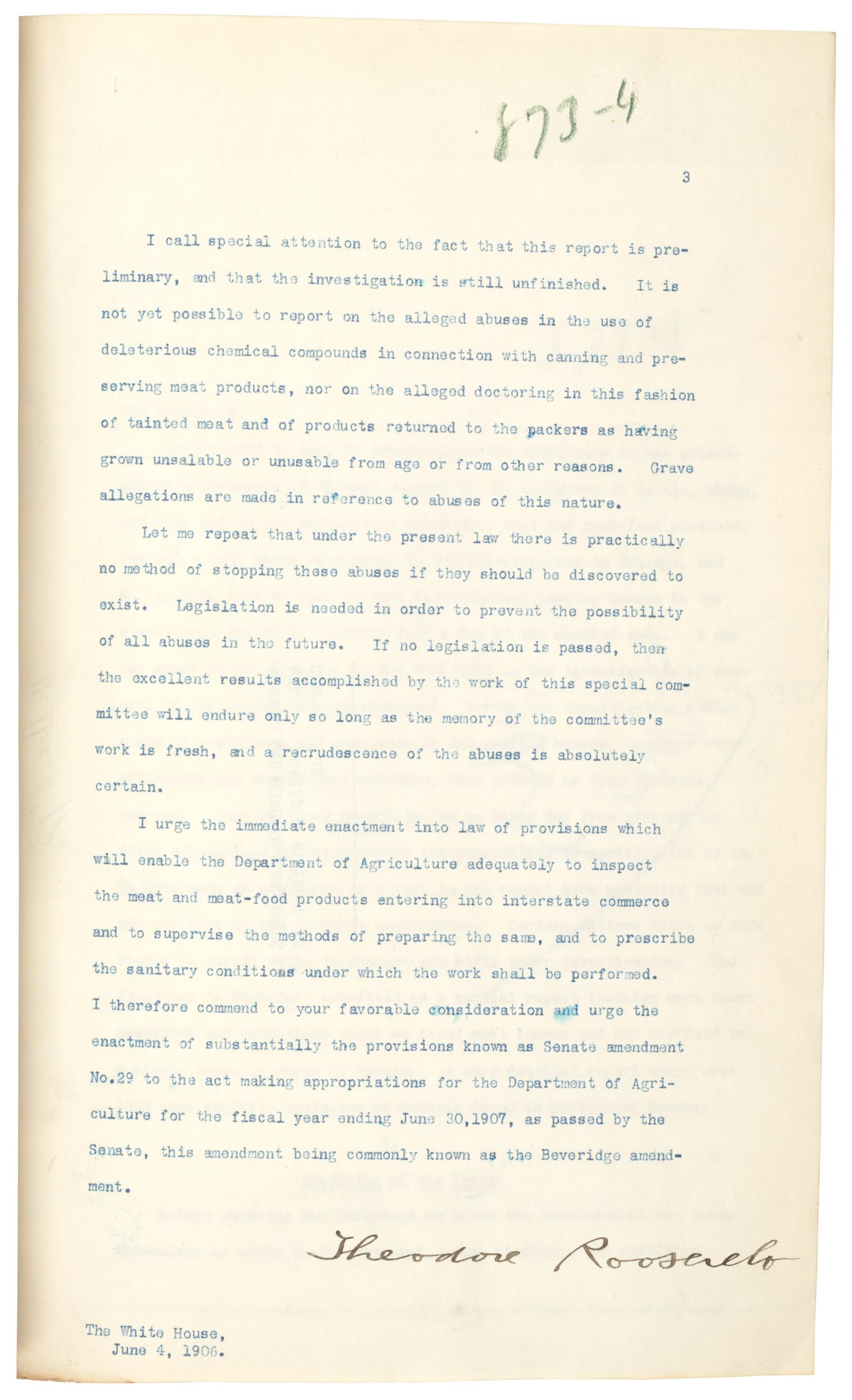
Report on Conditions in the Chicago Stock Yards
Page 7
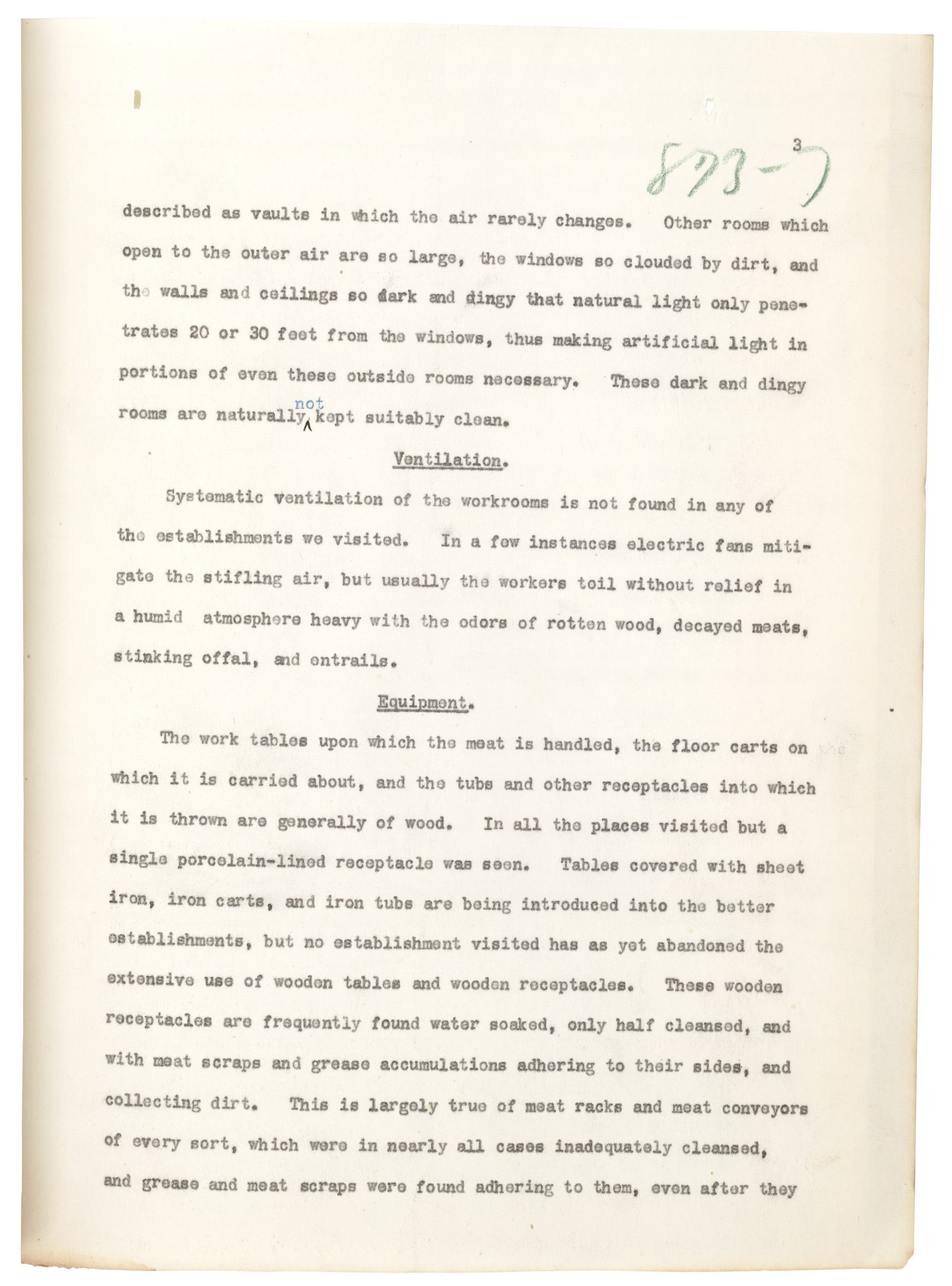
Report on Conditions in the Chicago Stock Yards
Page 8
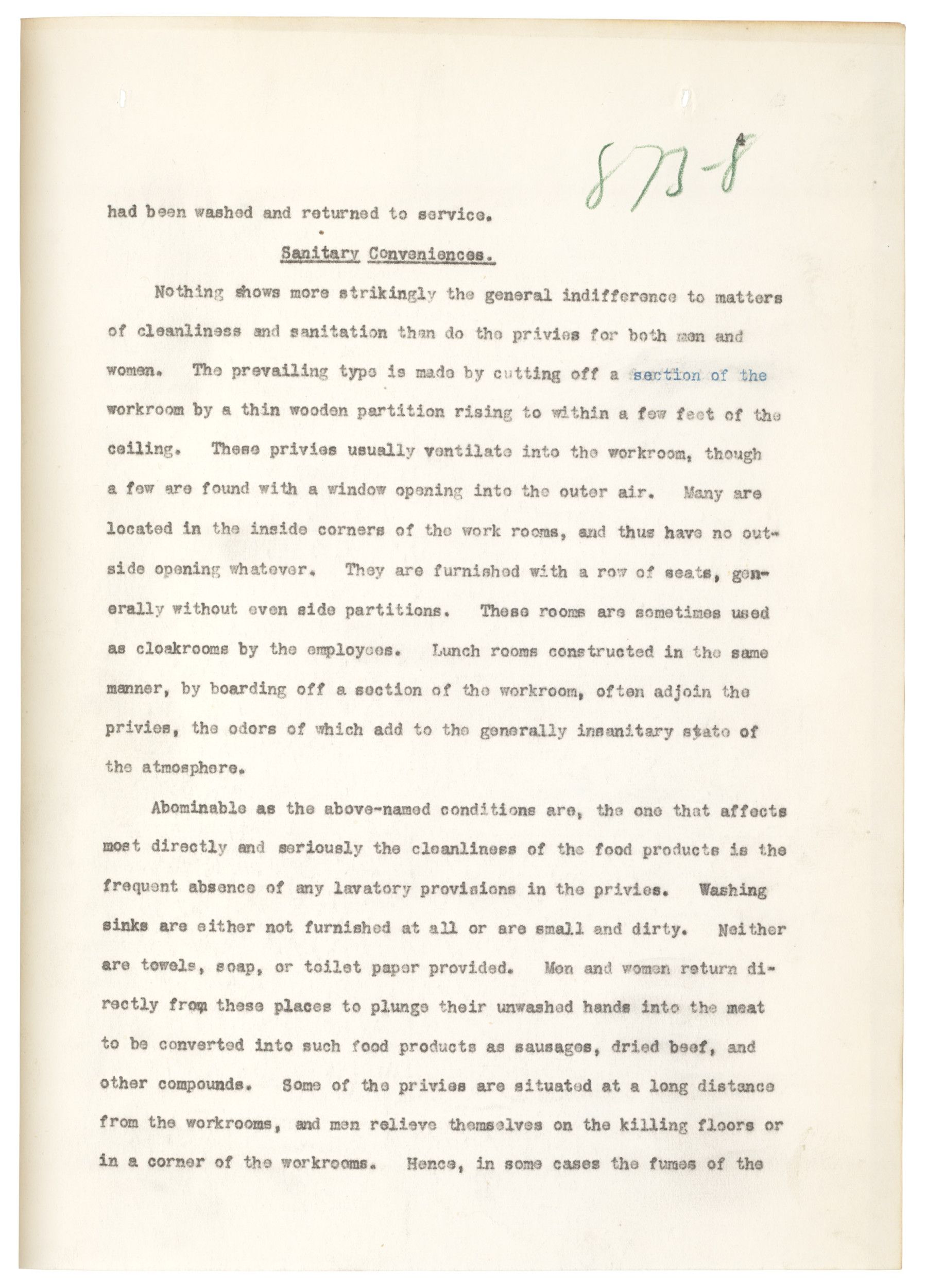
Report on Conditions in the Chicago Stock Yards
Page 9
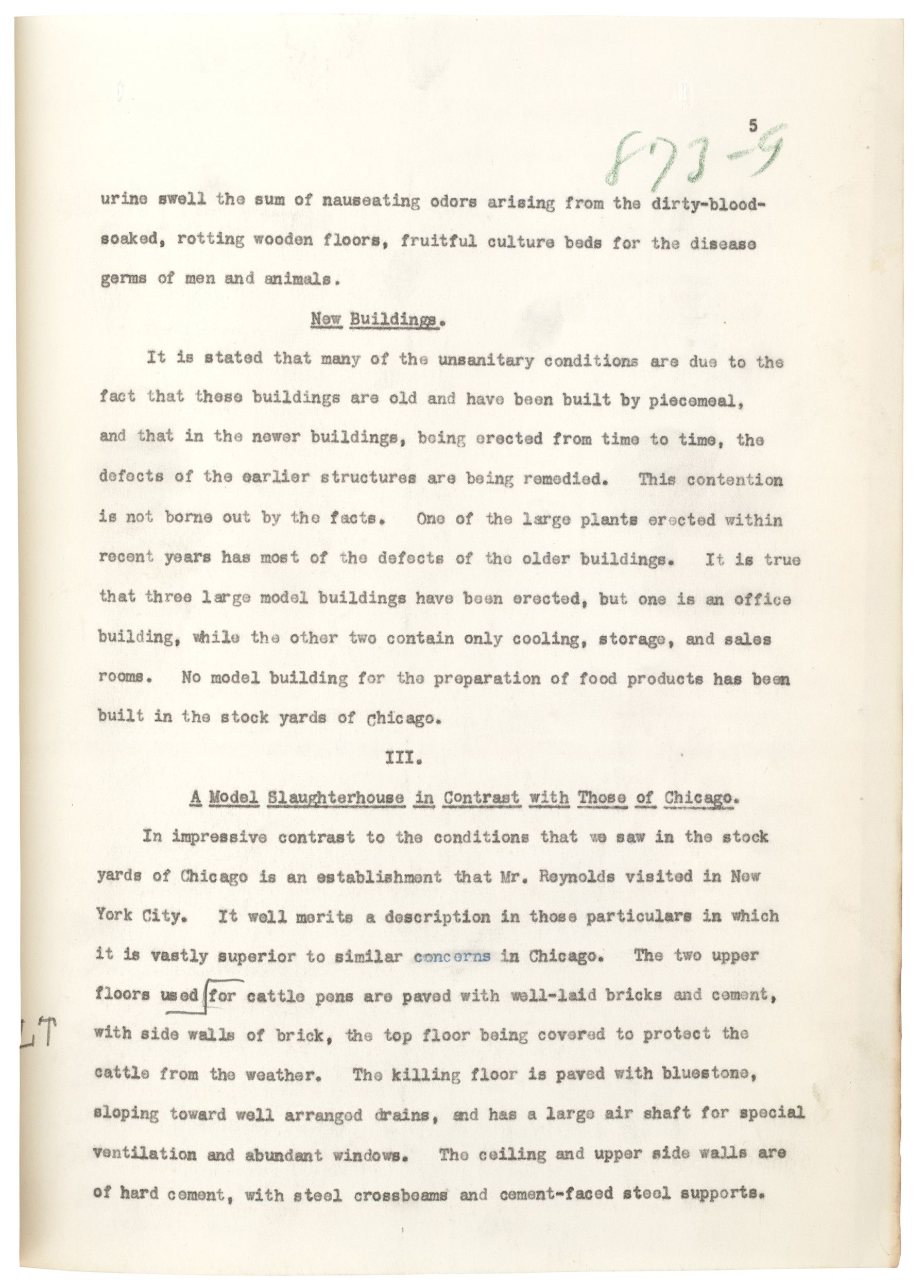
Report on Conditions in the Chicago Stock Yards
Page 12
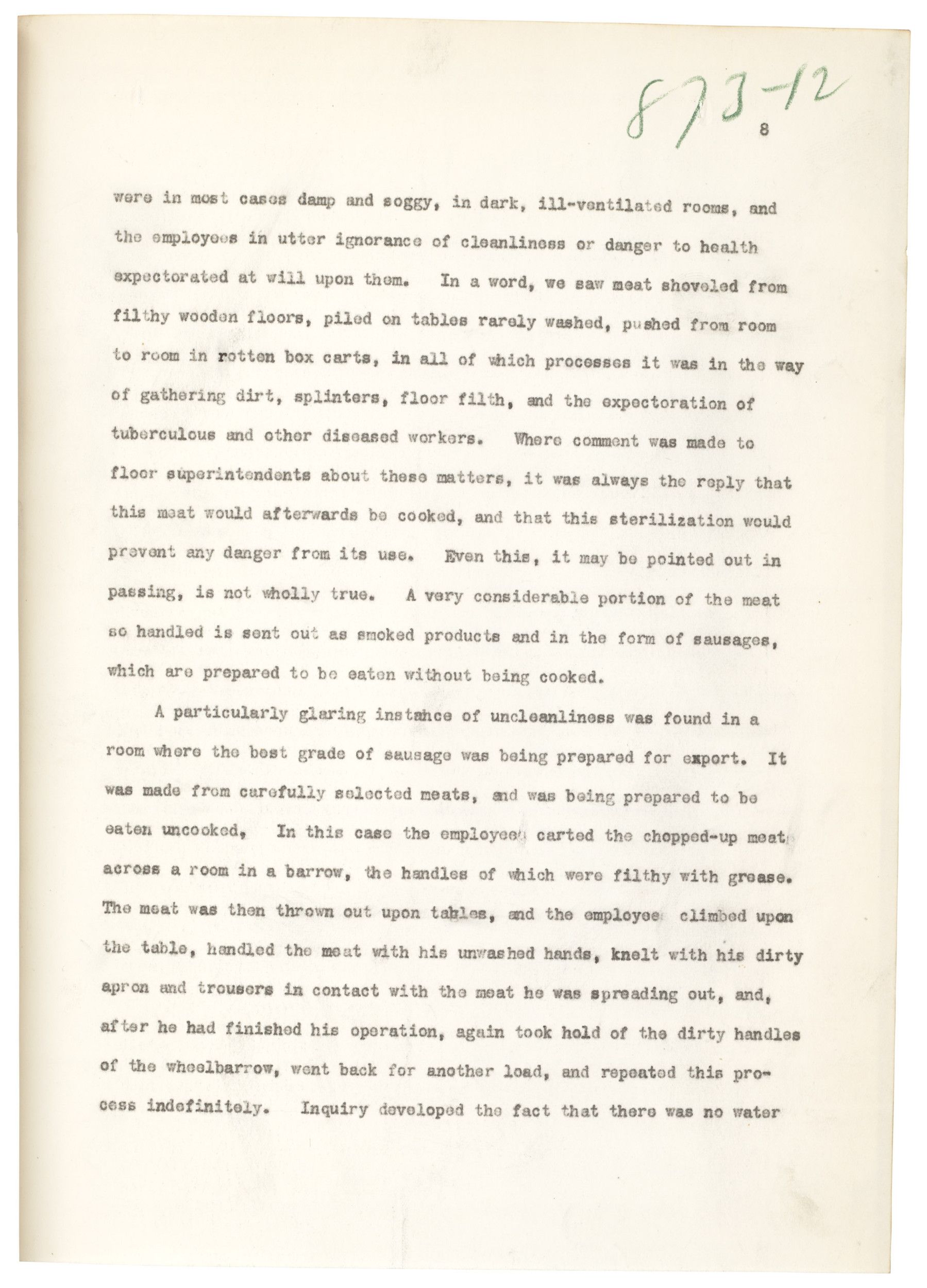
Report on Conditions in the Chicago Stock Yards
Page 13
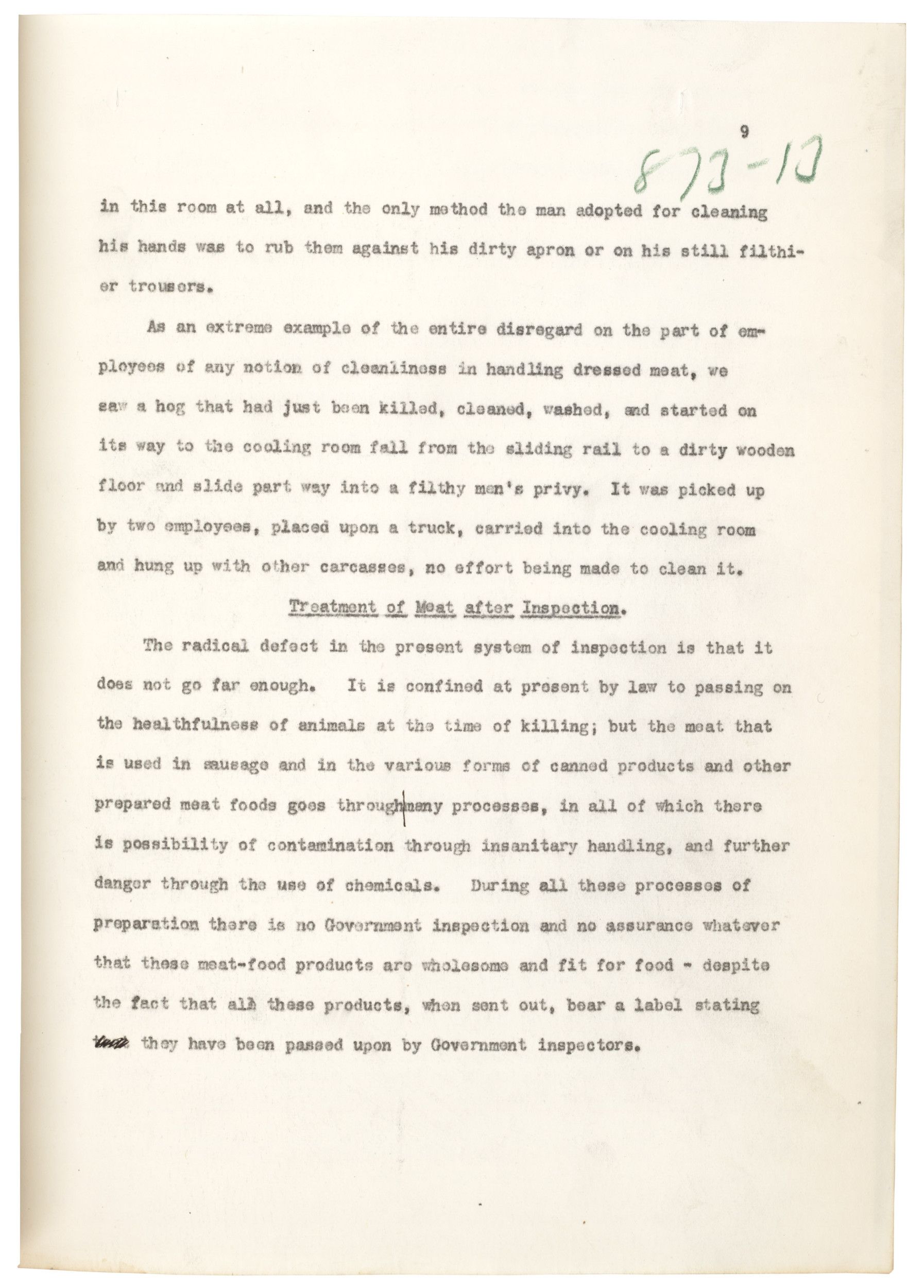
Report on Conditions in the Chicago Stock Yards
Page 14
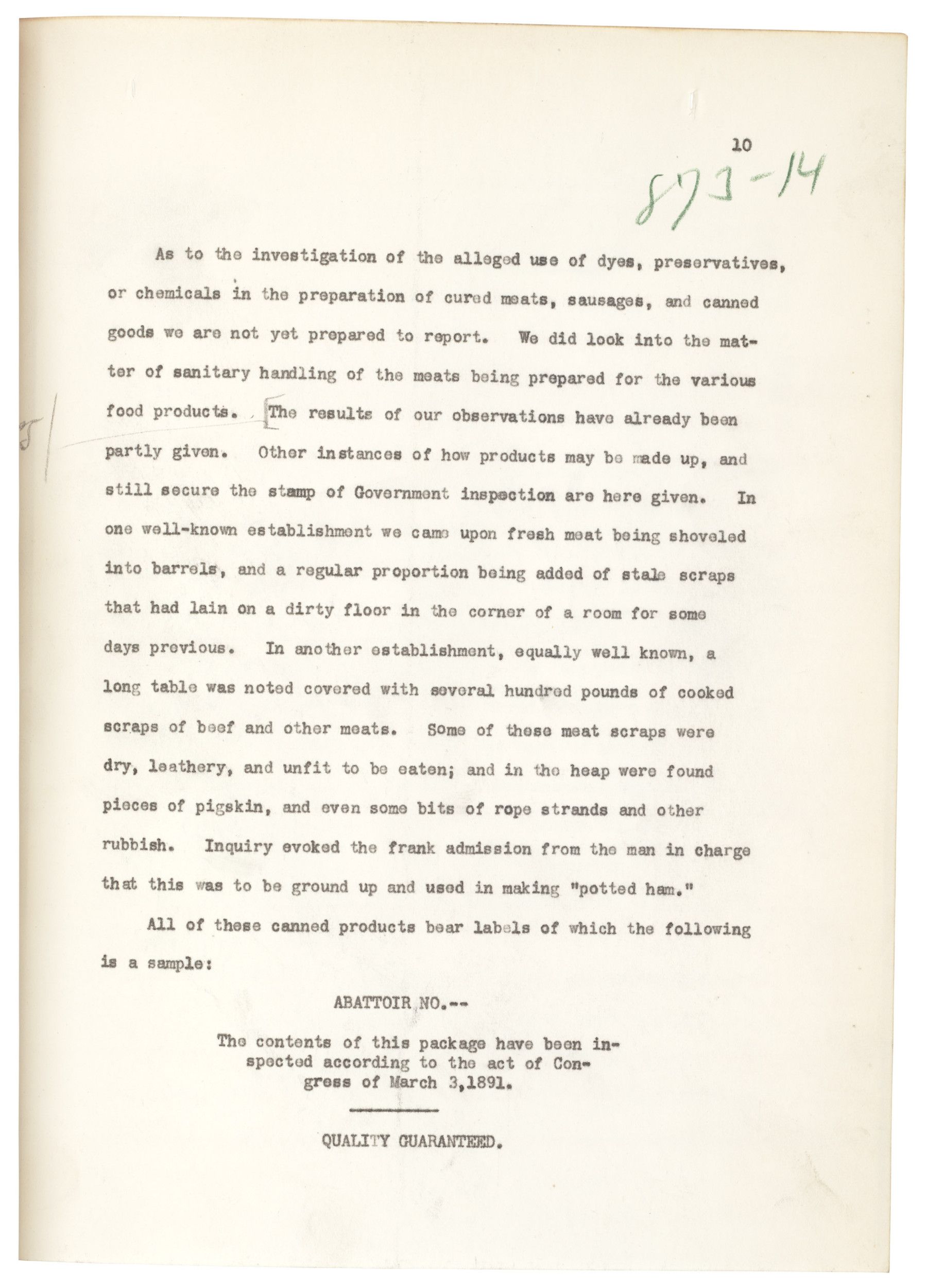
Report on Conditions in the Chicago Stock Yards
Page 17
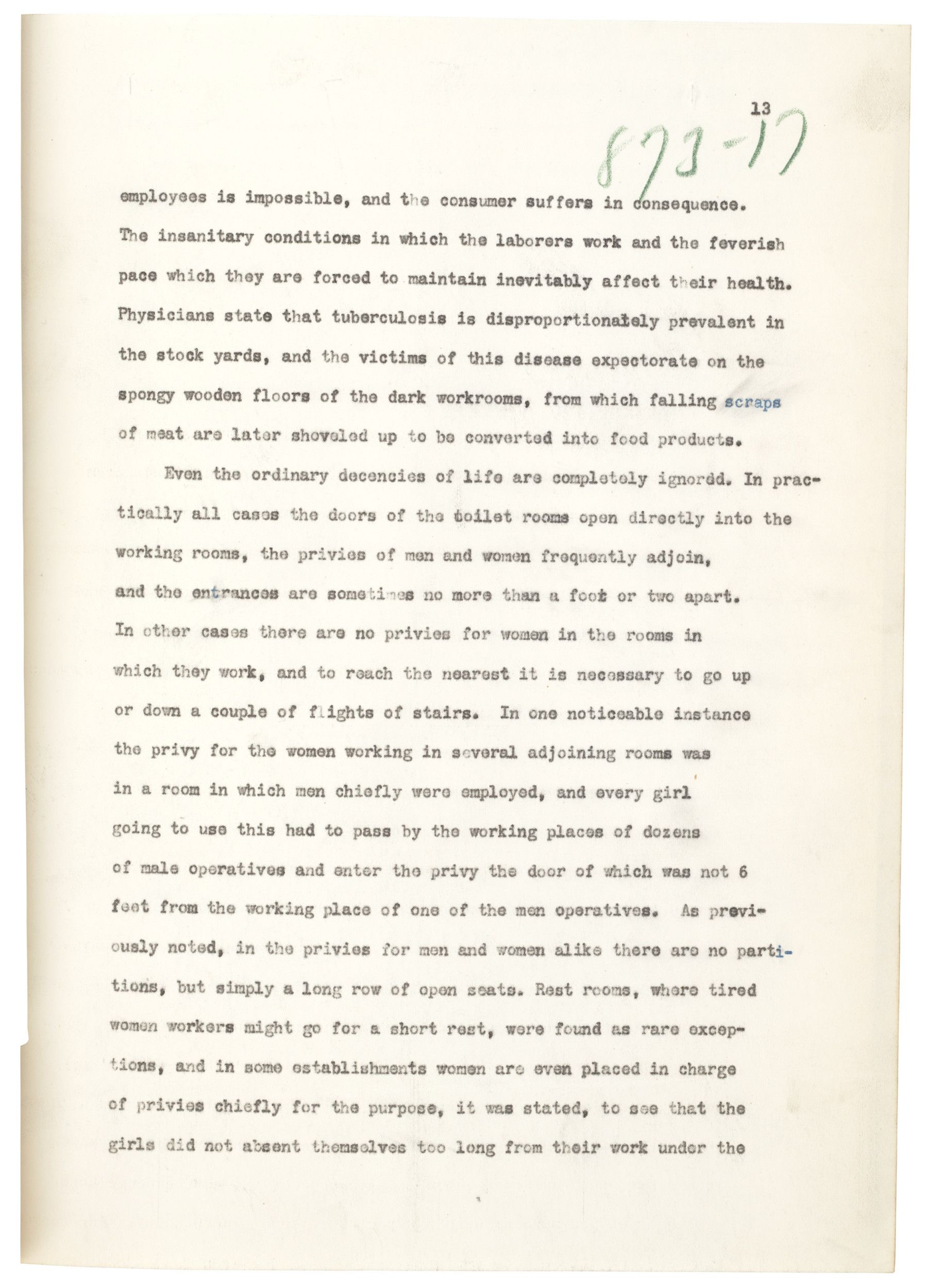
Report on Conditions in the Chicago Stock Yards
Page 18
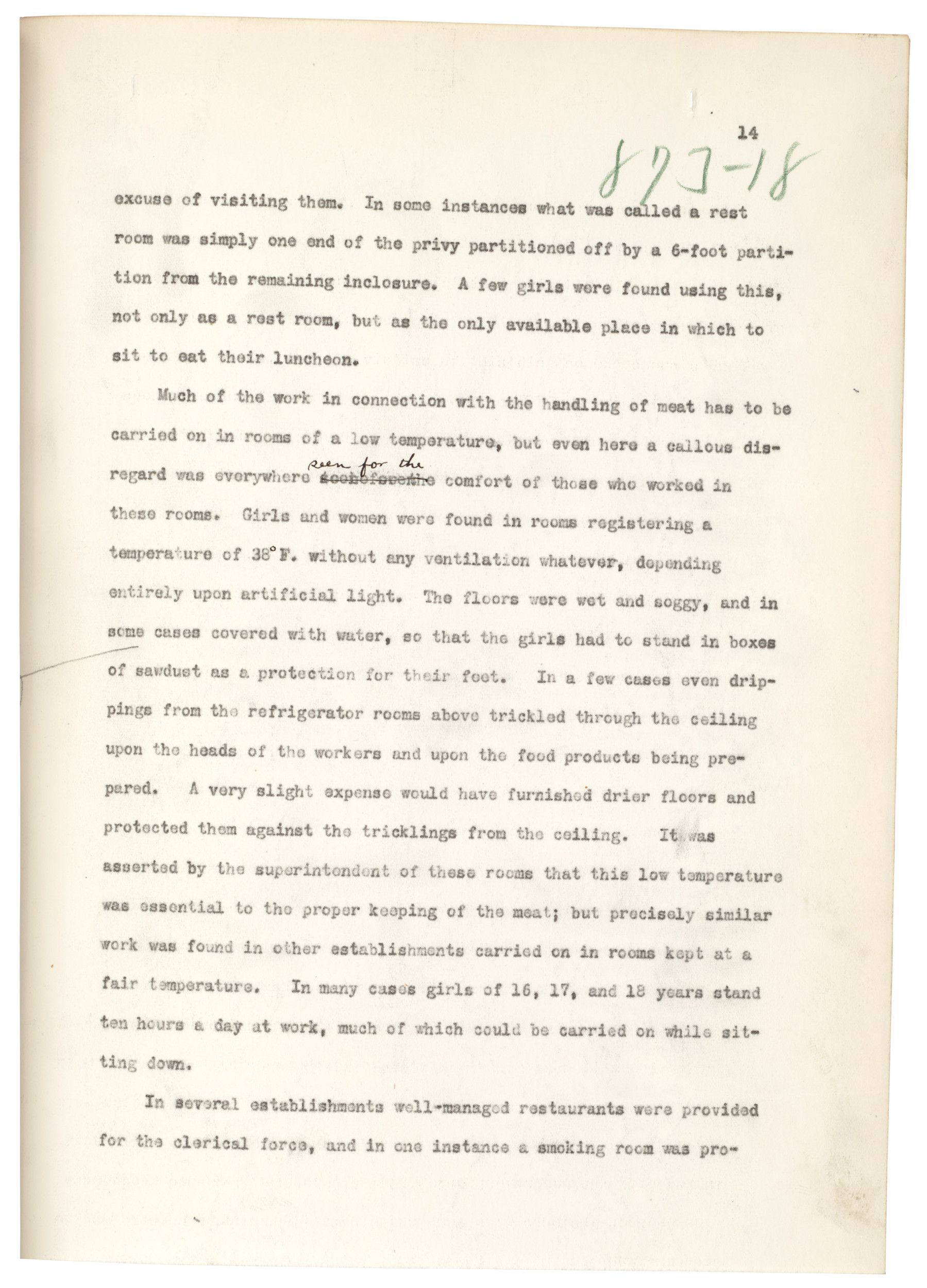
Report on Conditions in the Chicago Stock Yards
Page 19
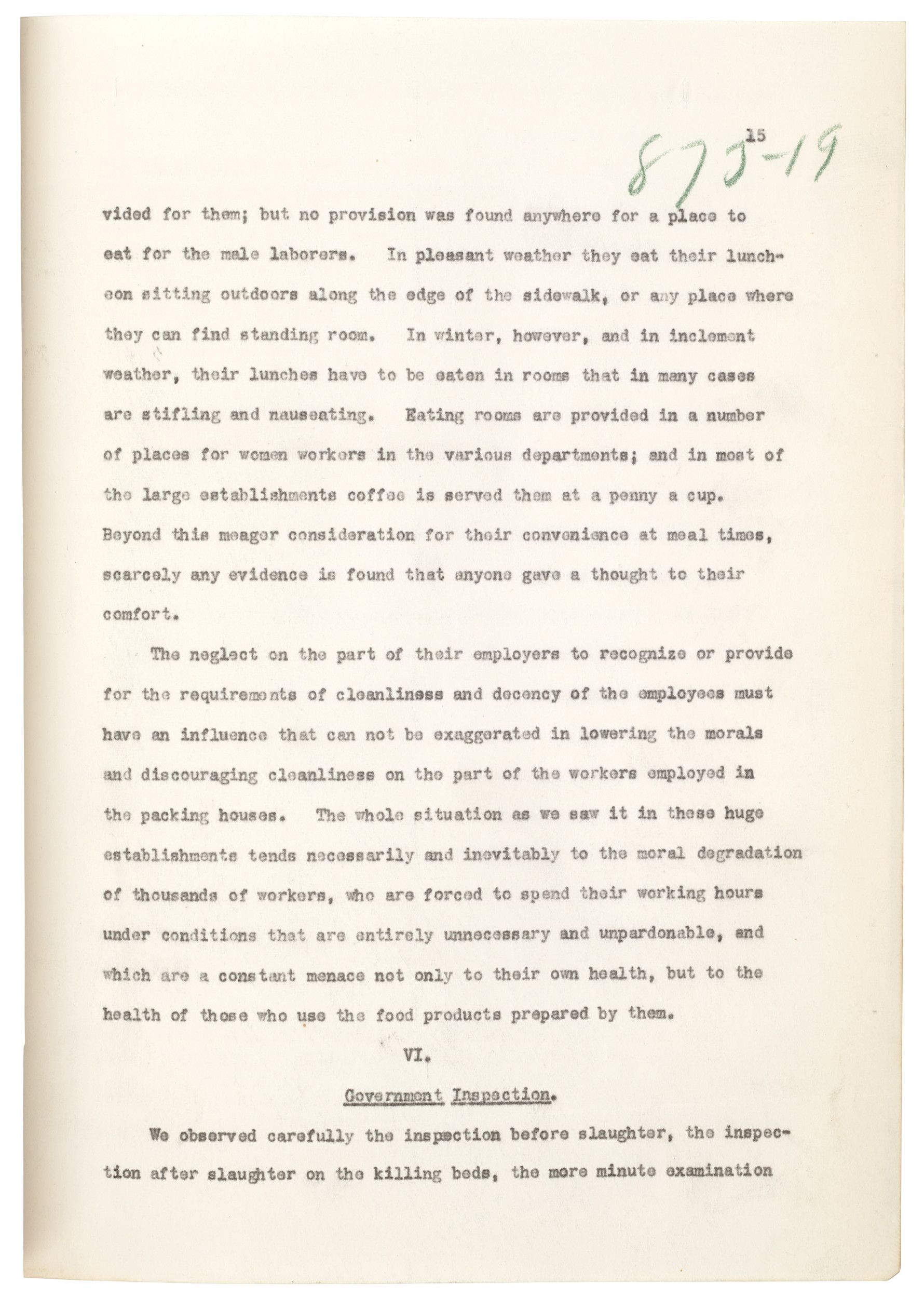
Report on Conditions in the Chicago Stock Yards
Page 20
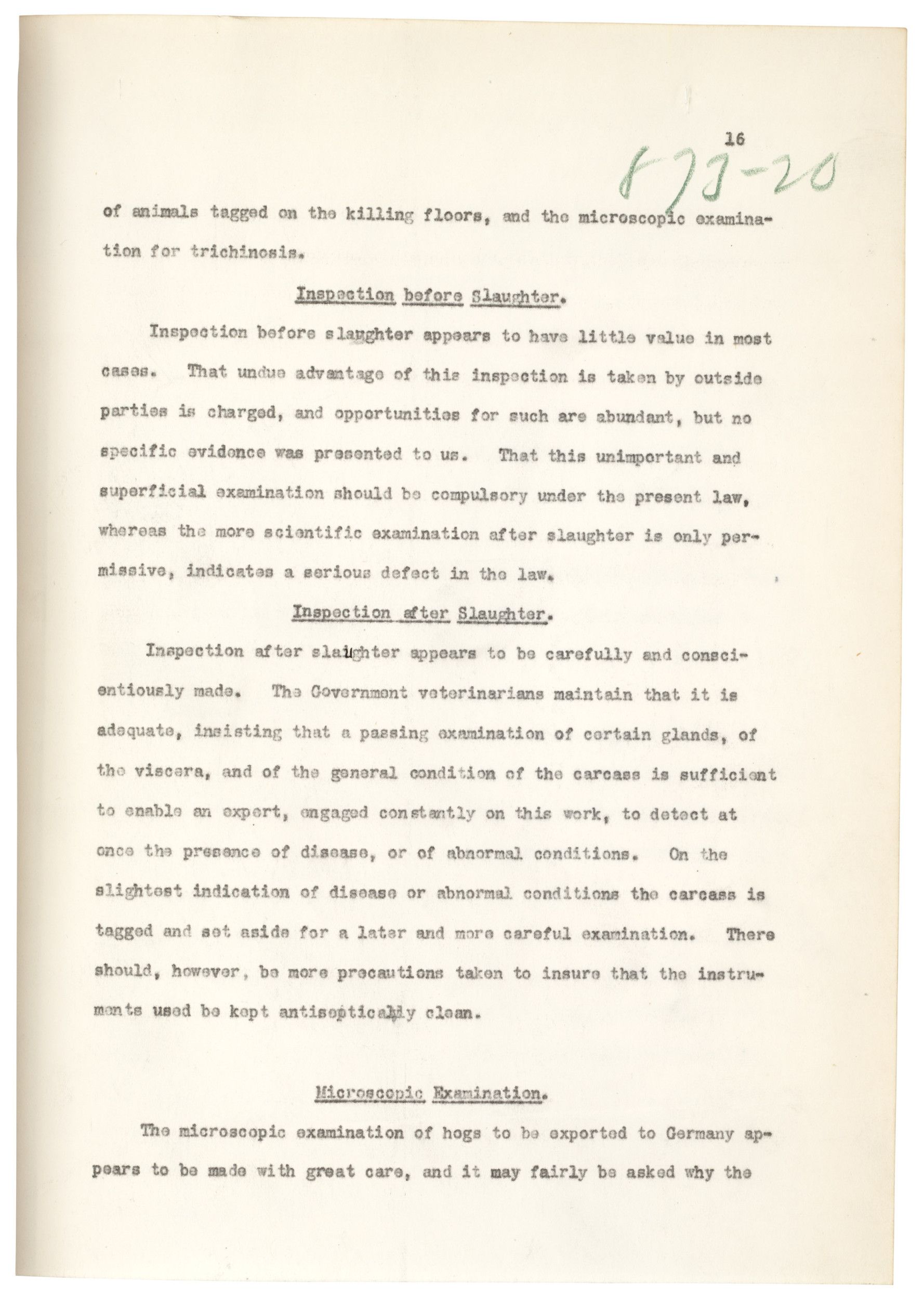
Report on Conditions in the Chicago Stock Yards
Page 21
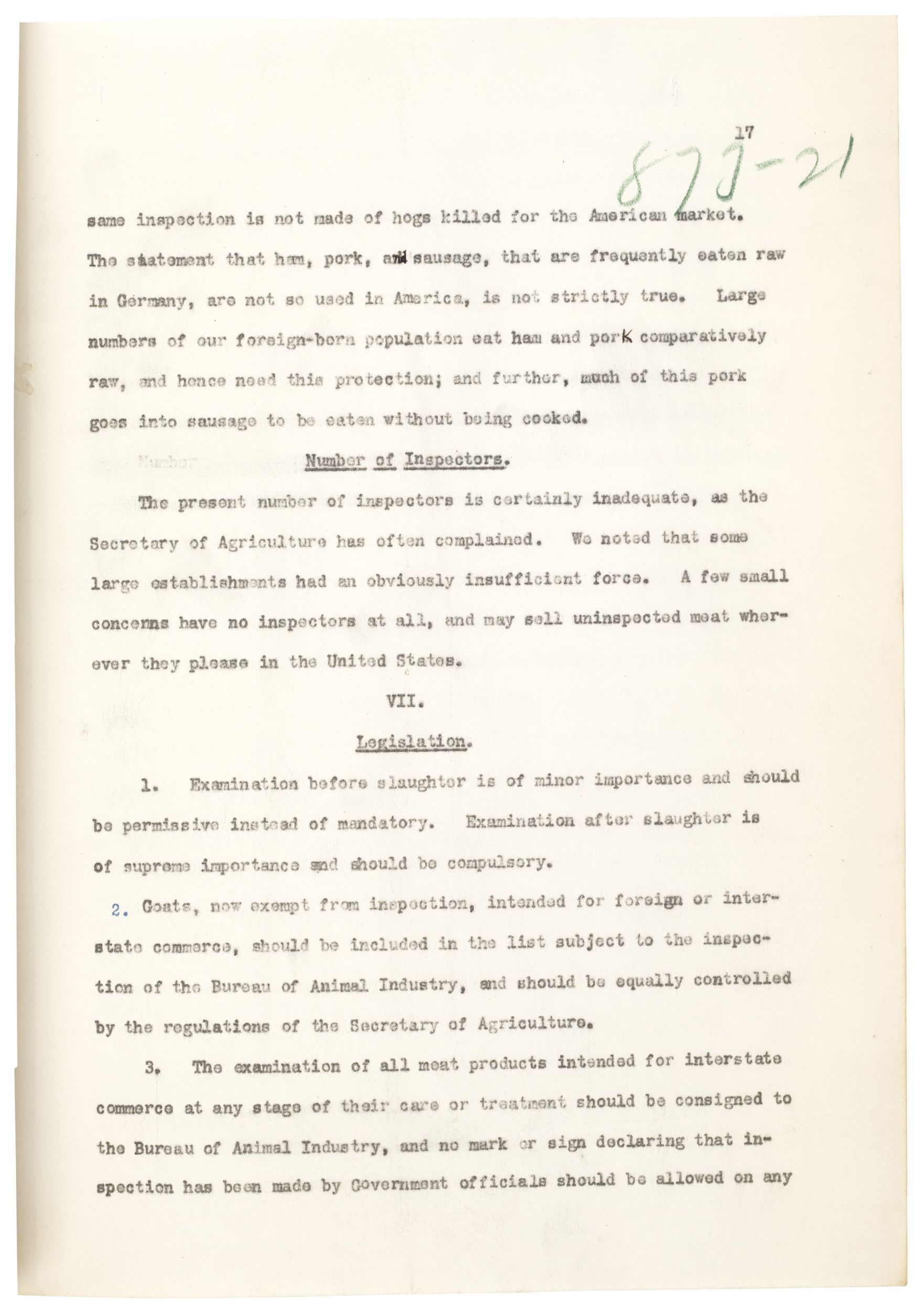
Report on Conditions in the Chicago Stock Yards
Page 22
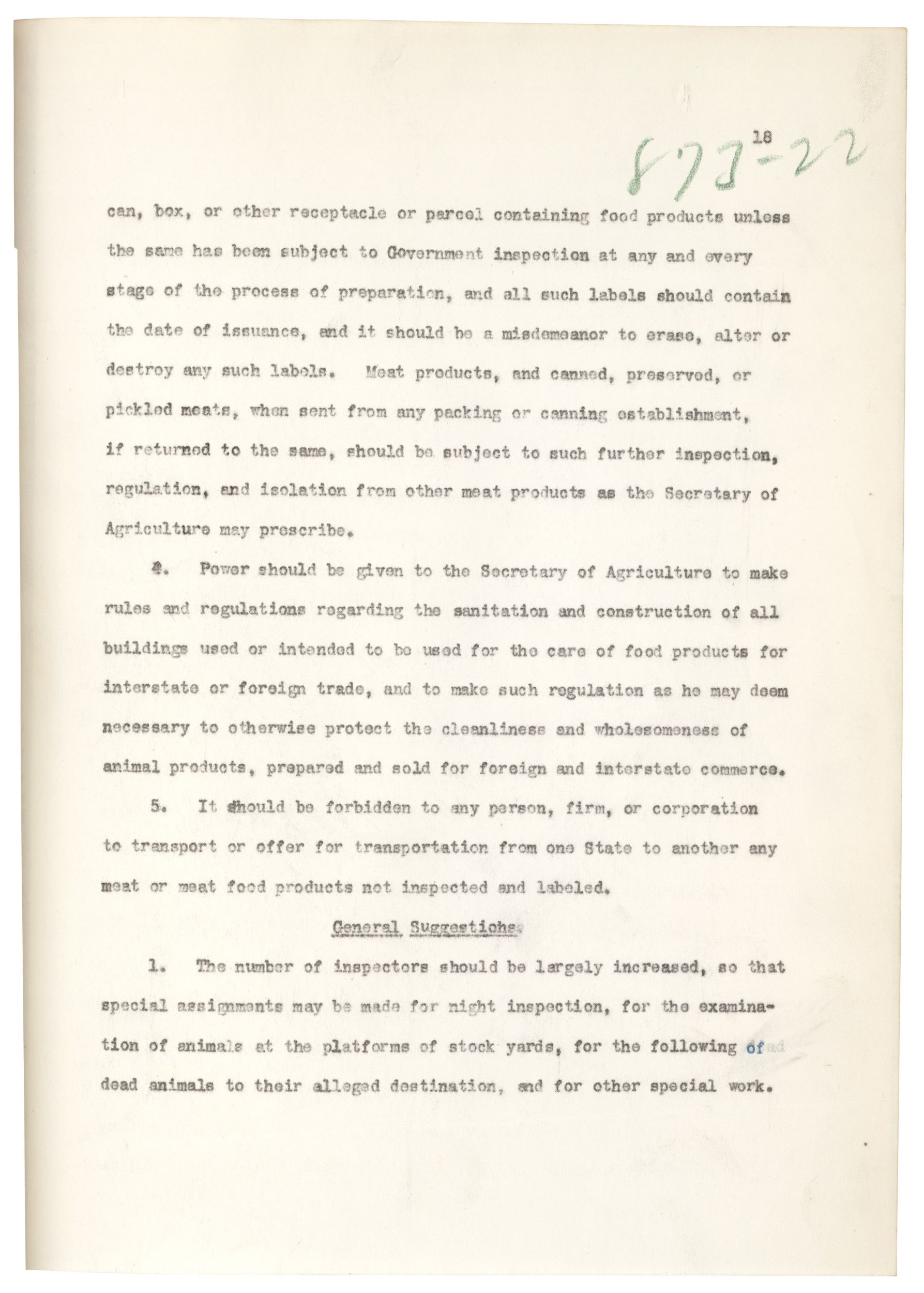
Report on Conditions in the Chicago Stock Yards
Page 23
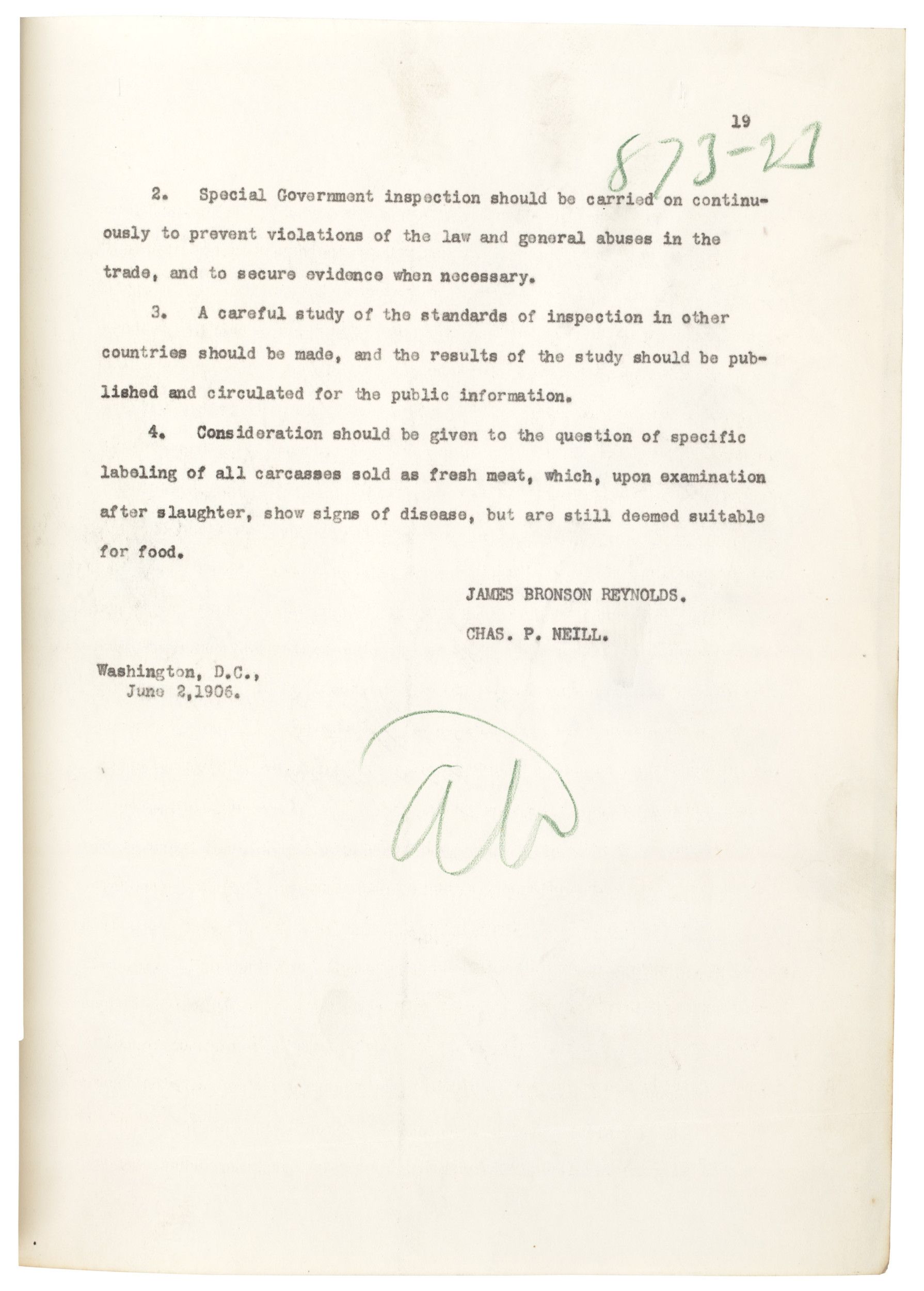
Document
Letter from Upton Sinclair to President Theodore Roosevelt
3/10/1906
In this letter to President Roosevelt, author Upton Sinclair expresses his support for the presence of federal inspectors in the meat-packing houses. He advised that inspectors should come disguised as workingmen to discover the true conditions, as Sinclair did when he researched his book The Jungle.
The Jungle riled up the United States and its President, Teddy Roosevelt, by revealing the unsanitary conditions under which food was made. On June 30, 1906, President Roosevelt signed into law the Pure Food and Drug Act, effectively creating the Food and Drug Administration.
Roosevelt had read an advanced copy of The Jungle. But almost before he finished reading it—barely a week after its first publication—Sinclair was peppering the President with letters and recommendations on how to regulate the industry. Roosevelt was sympathetic to Sinclair’s desire to regulate the industry but despised the man’s zealotry. "Tell Sinclair to go home and let me run the country for a while," Roosevelt said. Still, the two shared a lunch at the White House and an extensive correspondence—possibly sharing more letters than any President with an author who wasn’t writing a biography. Sinclair’s passionate descriptions of the meatpacking industry, and Roosevelt’s pursuit of reform in the industry, led to the nation’s first consumer protection laws.
The Jungle riled up the United States and its President, Teddy Roosevelt, by revealing the unsanitary conditions under which food was made. On June 30, 1906, President Roosevelt signed into law the Pure Food and Drug Act, effectively creating the Food and Drug Administration.
Roosevelt had read an advanced copy of The Jungle. But almost before he finished reading it—barely a week after its first publication—Sinclair was peppering the President with letters and recommendations on how to regulate the industry. Roosevelt was sympathetic to Sinclair’s desire to regulate the industry but despised the man’s zealotry. "Tell Sinclair to go home and let me run the country for a while," Roosevelt said. Still, the two shared a lunch at the White House and an extensive correspondence—possibly sharing more letters than any President with an author who wasn’t writing a biography. Sinclair’s passionate descriptions of the meatpacking industry, and Roosevelt’s pursuit of reform in the industry, led to the nation’s first consumer protection laws.
This primary source comes from the Records of the Office of the Secretary of Agriculture.
National Archives Identifier: 301981
Full Citation: Letter from Upton Sinclair to President Theodore Roosevelt; 3/10/1906; Letters Received, 1893 - 1906; Records of the Office of the Secretary of Agriculture, ; National Archives at College Park, College Park, MD. [Online Version, https://www.docsteach.org/documents/document/sinclair-roosevelt, April 19, 2024]Letter from Upton Sinclair to President Theodore Roosevelt
Page 1
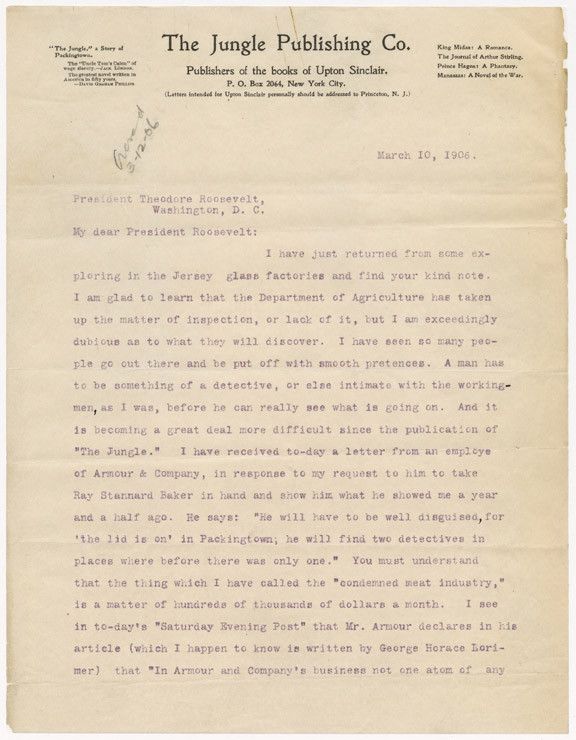
Letter from Upton Sinclair to President Theodore Roosevelt
Page 2
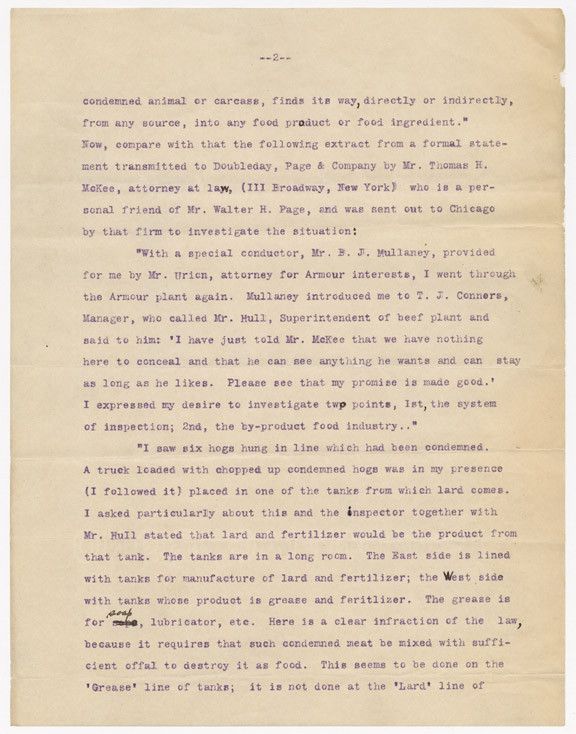
Letter from Upton Sinclair to President Theodore Roosevelt
Page 3
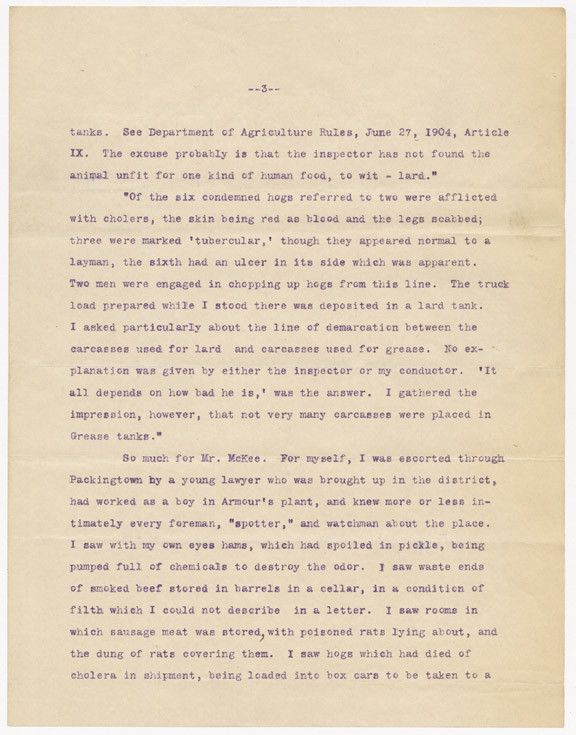
Letter from Upton Sinclair to President Theodore Roosevelt
Page 4
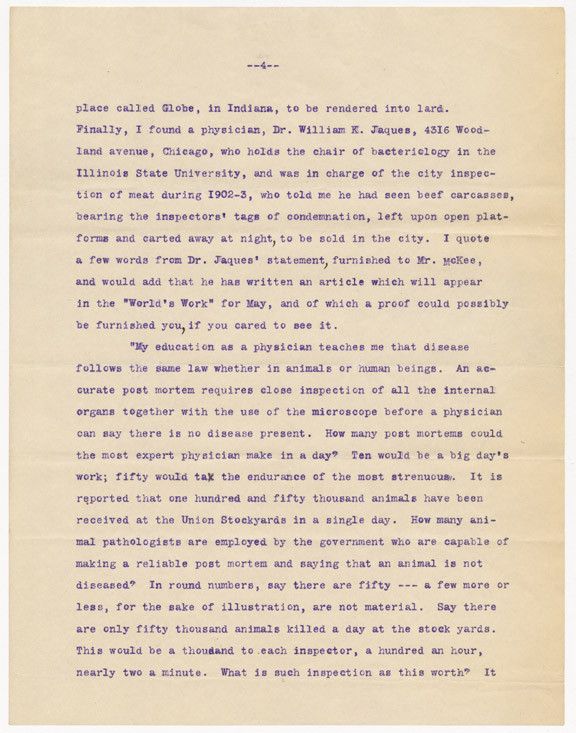
Letter from Upton Sinclair to President Theodore Roosevelt
Page 5
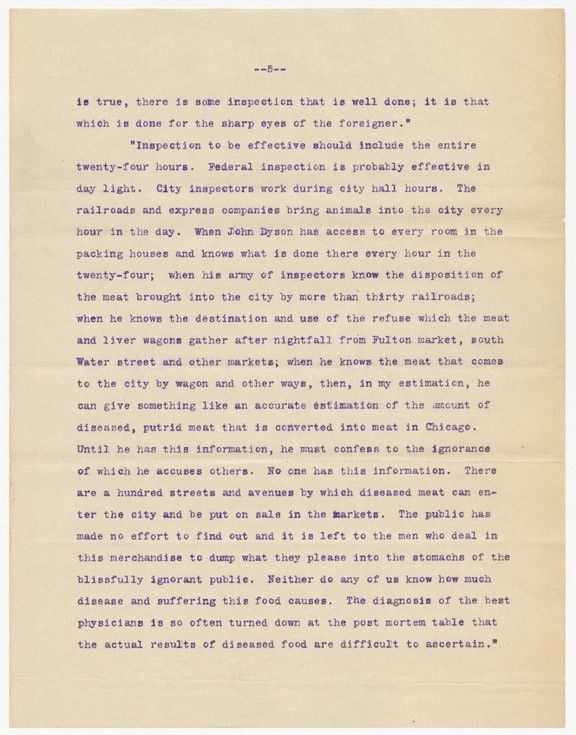
Letter from Upton Sinclair to President Theodore Roosevelt
Page 6
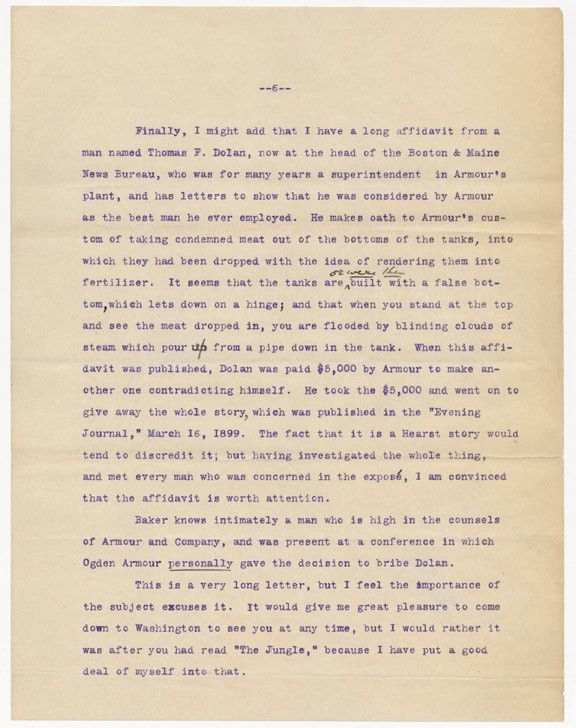
Letter from Upton Sinclair to President Theodore Roosevelt
Page 7
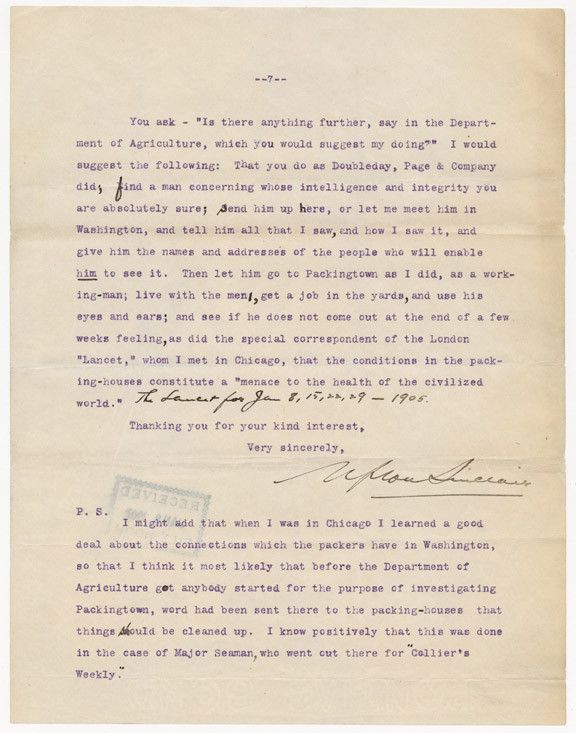
Document
Letter from Acting Secretary of State Robert Bacon to U.S. Ambassador to the United Kingdom Whitelaw Reid Discussing Postcards Regarding the Chicago Meatpacking Industry
10/9/1907
A State Department official fittingly named Robert Bacon sent these British postcards to the United States ambassador in London, Whitelaw Reid. One of Armour and Company’s general managers had complained that the cards were hurting their business.
This primary source comes from the General Records of the Department of State.
National Archives Identifier: 2657925
Full Citation: Letter from Acting Secretary of State Robert Bacon to U.S. Ambassador to the United Kingdom Whitelaw Reid Discussing Postcards Regarding the Chicago Meatpacking Industry; 10/9/1907; Numerical Files, 8/1906 - 1910; General Records of the Department of State, ; National Archives at College Park, College Park, MD. [Online Version, https://www.docsteach.org/documents/document/meatpacking-postcards, April 19, 2024]Letter from Acting Secretary of State Robert Bacon to U.S. Ambassador to the United Kingdom Whitelaw Reid Discussing Postcards Regarding the Chicago Meatpacking Industry
Page 1
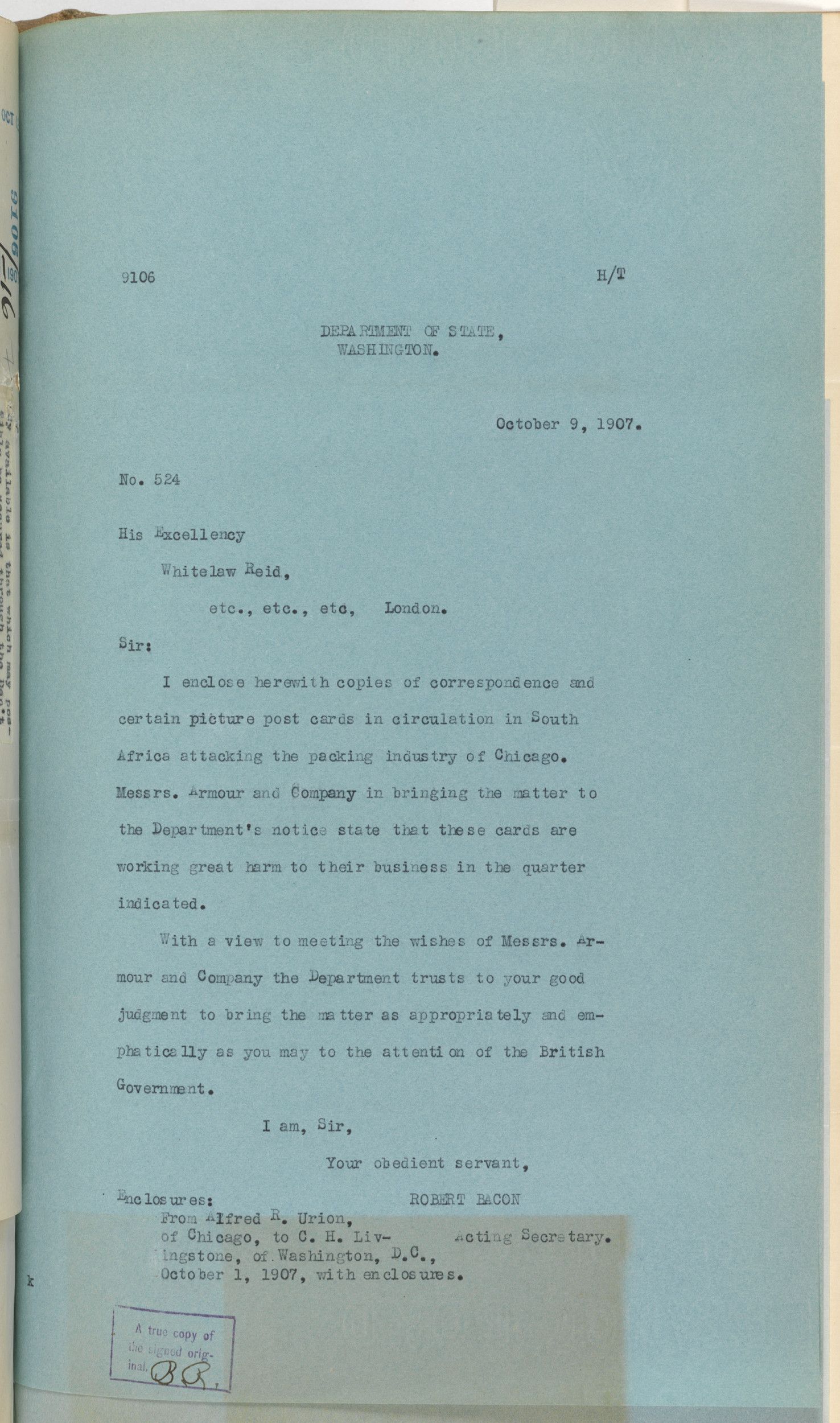
Letter from Acting Secretary of State Robert Bacon to U.S. Ambassador to the United Kingdom Whitelaw Reid Discussing Postcards Regarding the Chicago Meatpacking Industry
Page 2
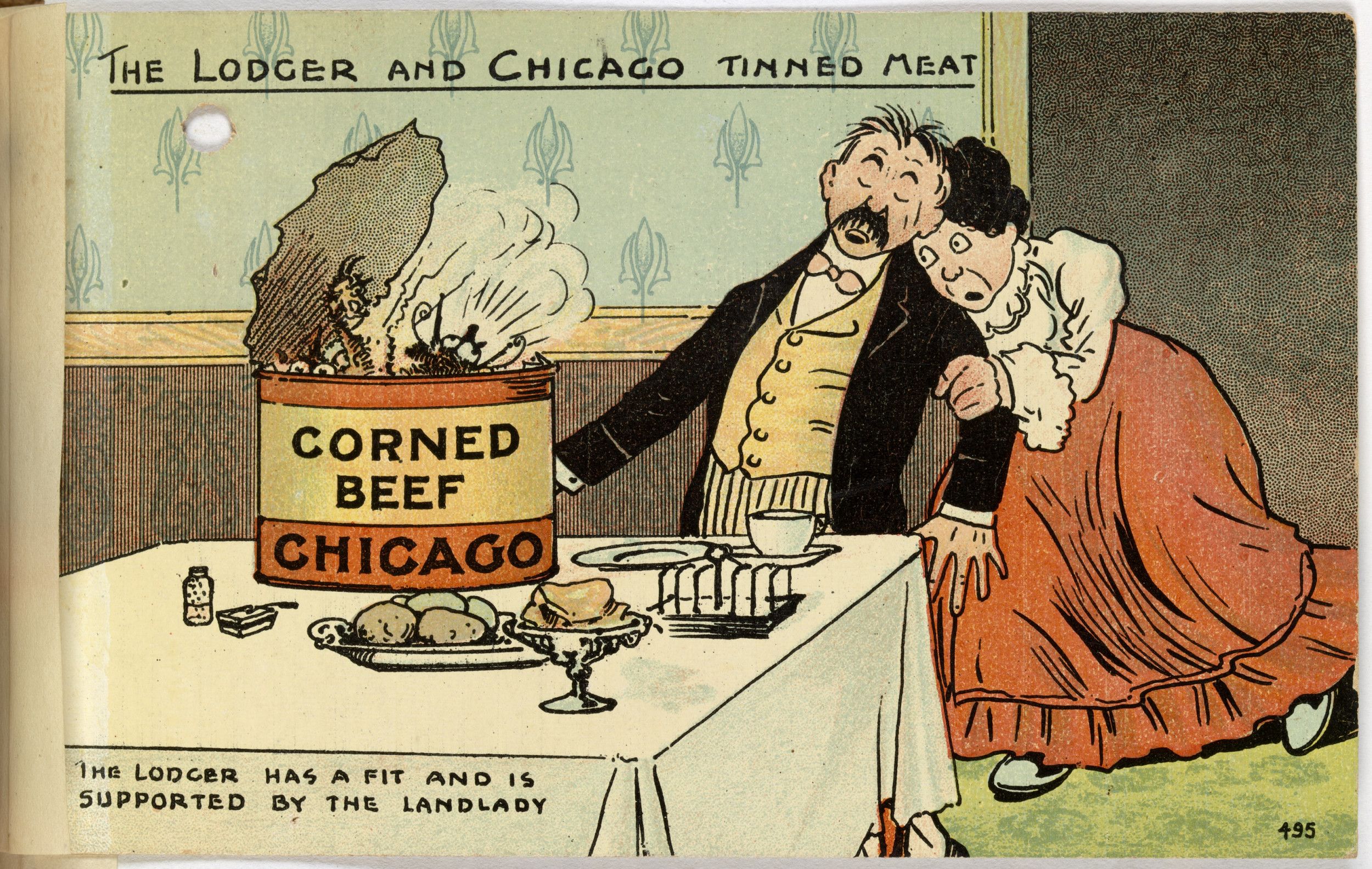
Letter from Acting Secretary of State Robert Bacon to U.S. Ambassador to the United Kingdom Whitelaw Reid Discussing Postcards Regarding the Chicago Meatpacking Industry
Page 3
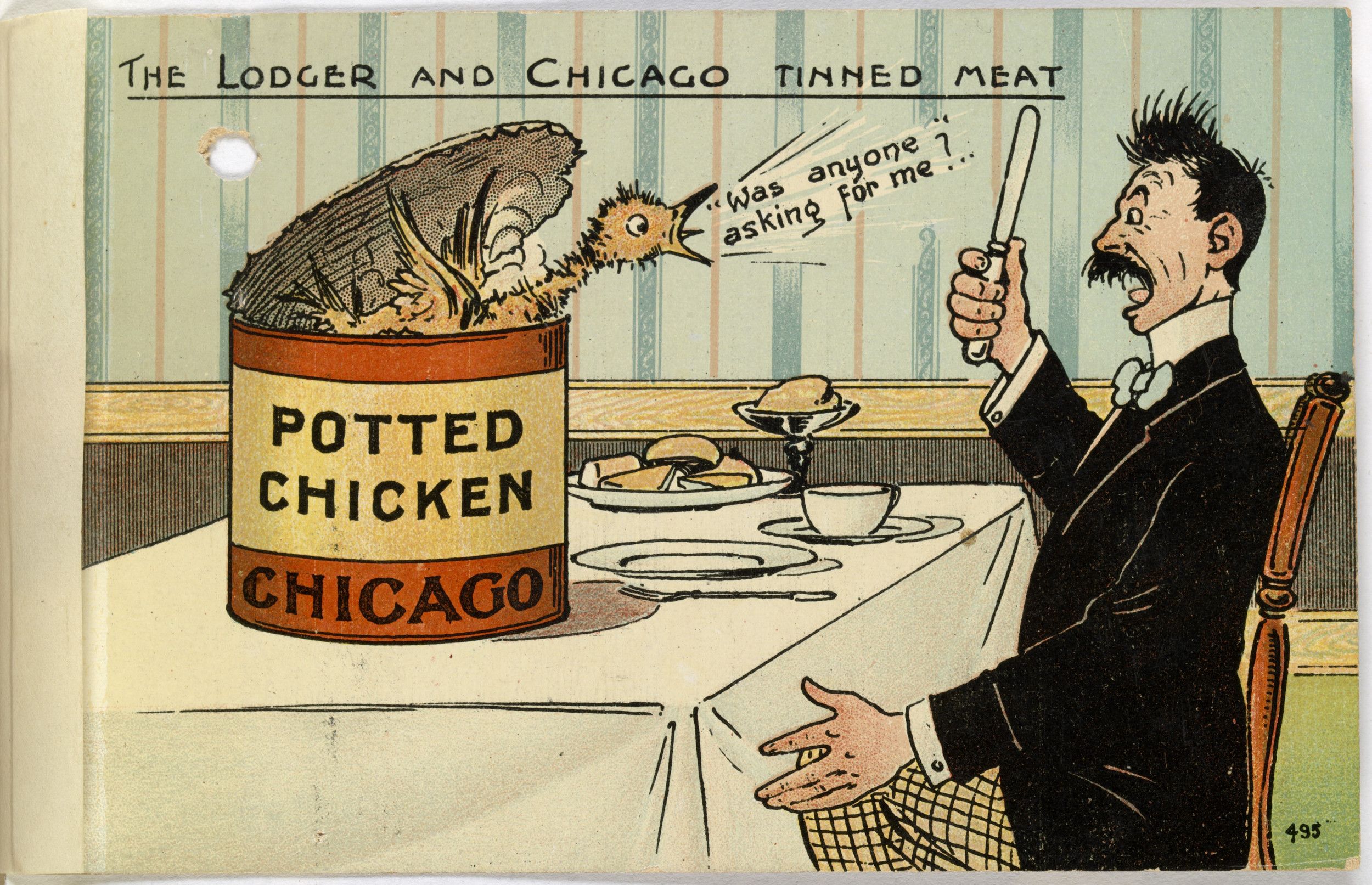
Letter from Acting Secretary of State Robert Bacon to U.S. Ambassador to the United Kingdom Whitelaw Reid Discussing Postcards Regarding the Chicago Meatpacking Industry
Page 4
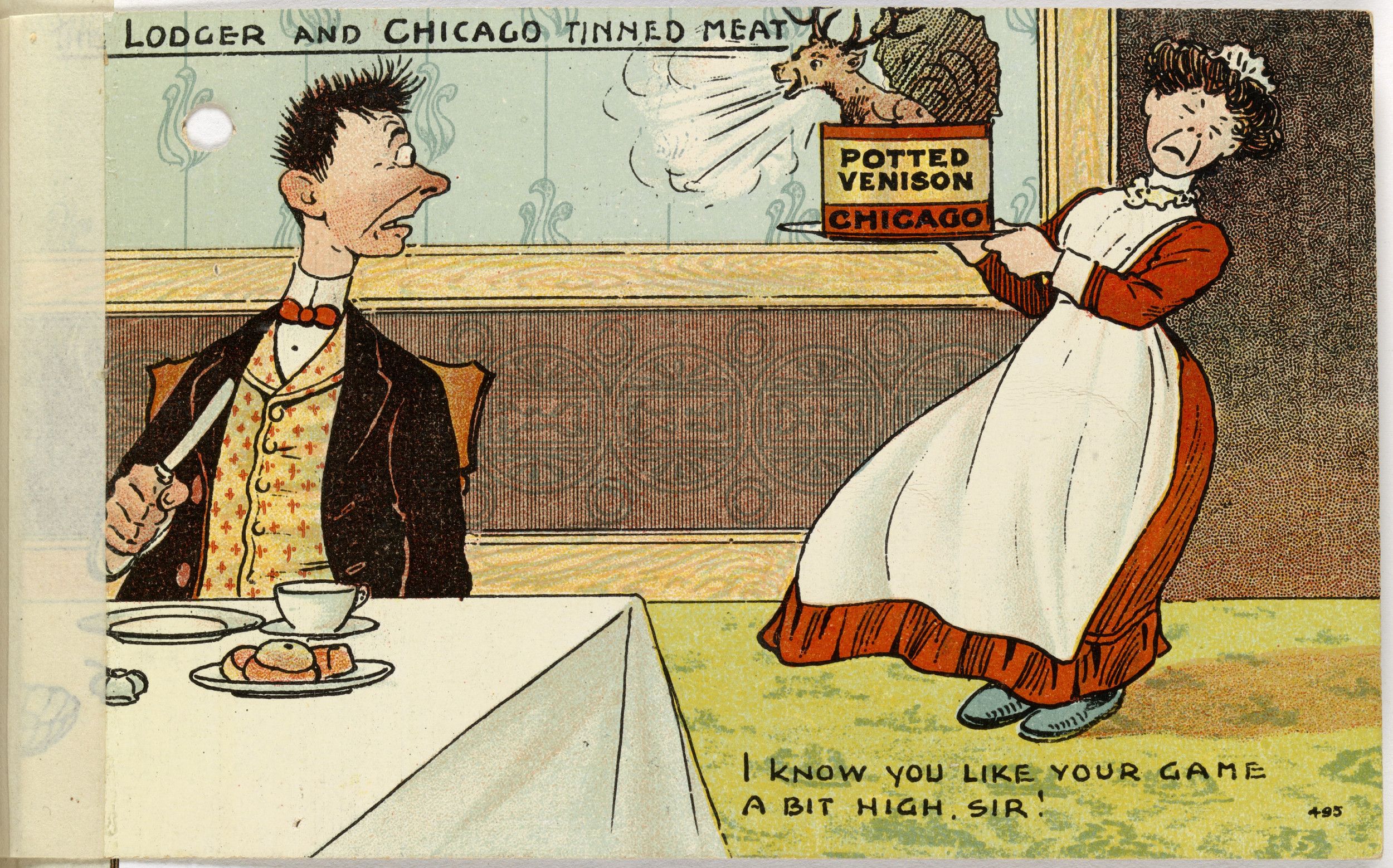
Letter from Acting Secretary of State Robert Bacon to U.S. Ambassador to the United Kingdom Whitelaw Reid Discussing Postcards Regarding the Chicago Meatpacking Industry
Page 5
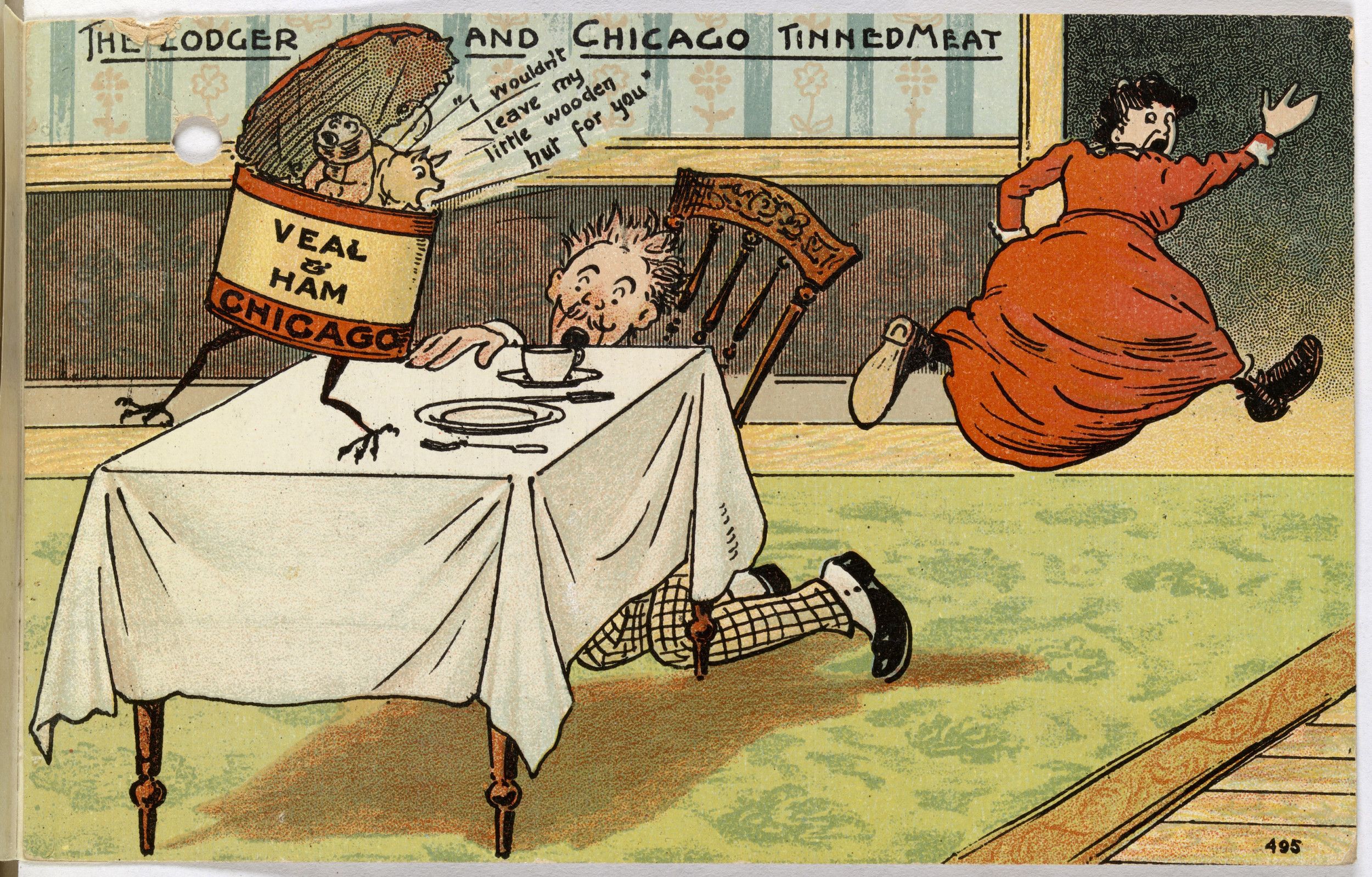
Letter from Acting Secretary of State Robert Bacon to U.S. Ambassador to the United Kingdom Whitelaw Reid Discussing Postcards Regarding the Chicago Meatpacking Industry
Page 6
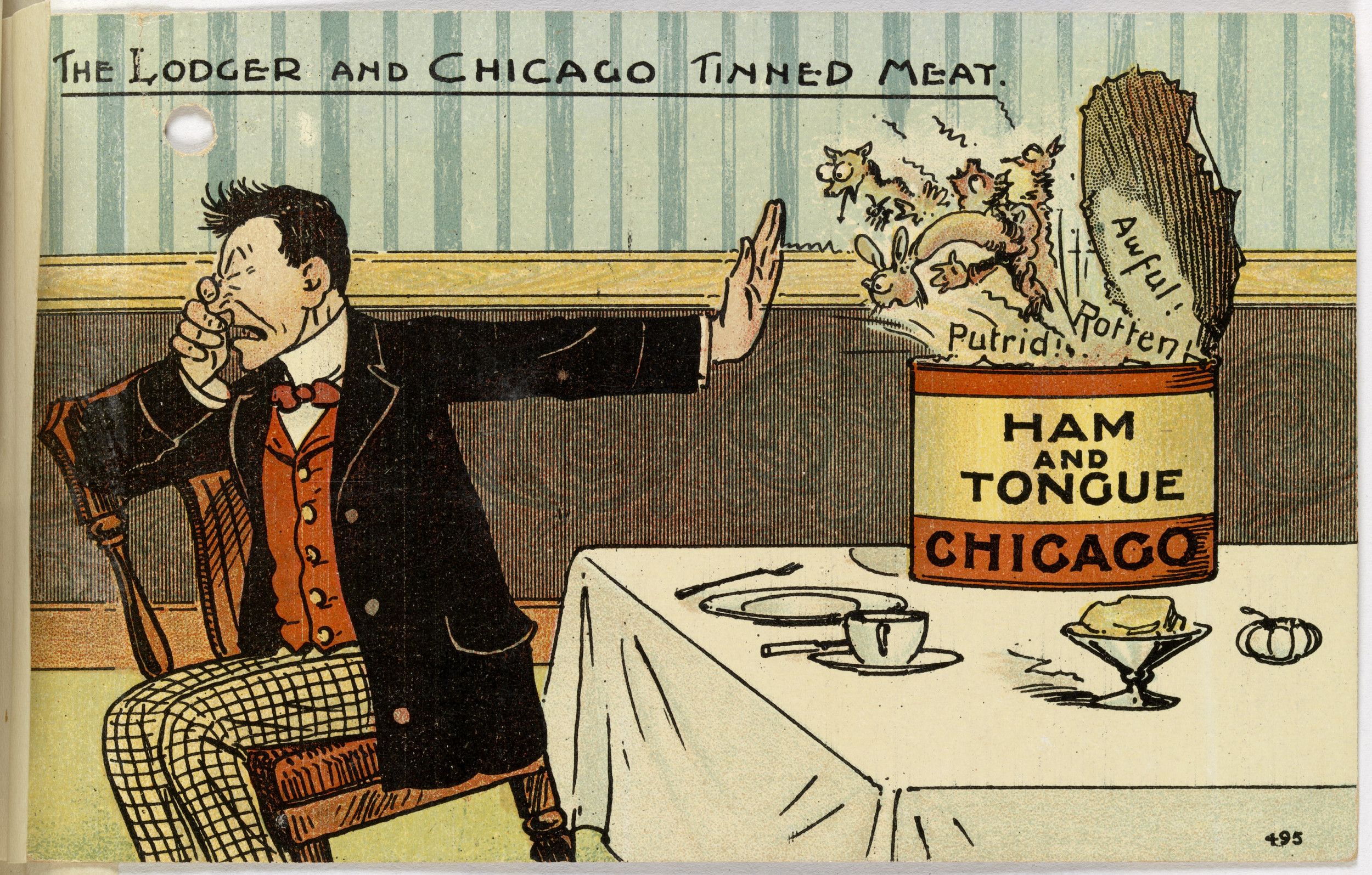
Letter from Acting Secretary of State Robert Bacon to U.S. Ambassador to the United Kingdom Whitelaw Reid Discussing Postcards Regarding the Chicago Meatpacking Industry
Page 7
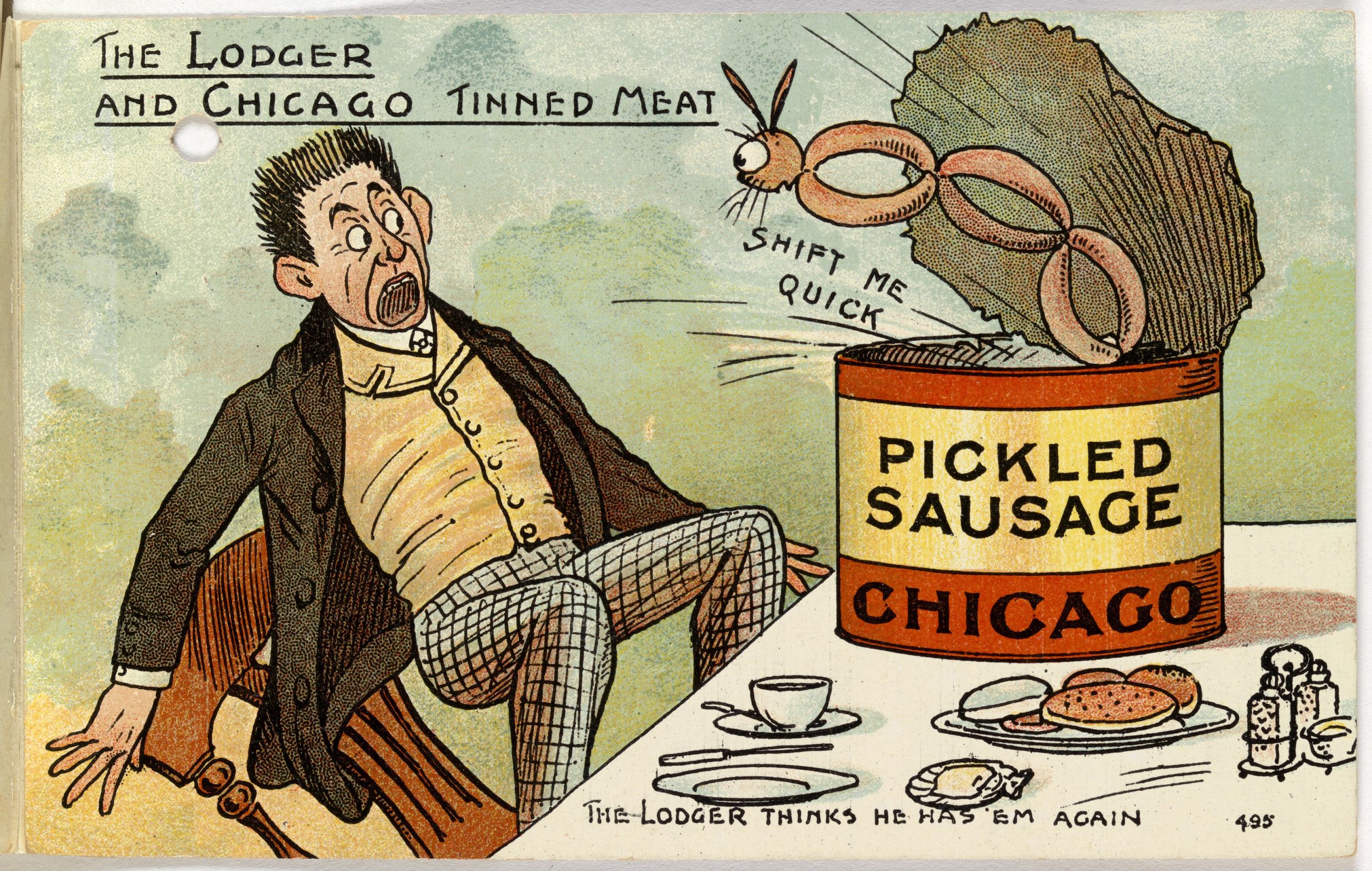
Letter from Acting Secretary of State Robert Bacon to U.S. Ambassador to the United Kingdom Whitelaw Reid Discussing Postcards Regarding the Chicago Meatpacking Industry
Page 8
